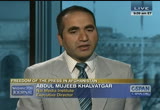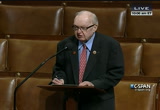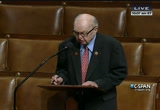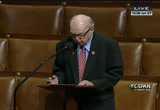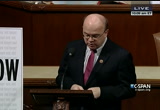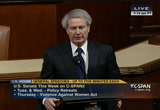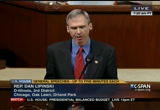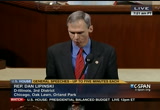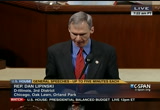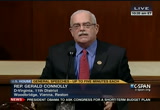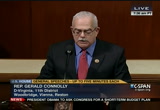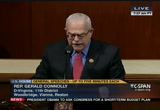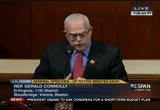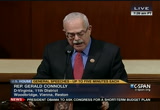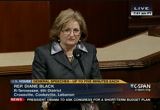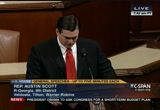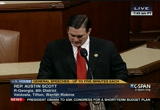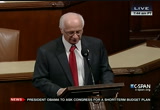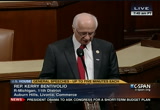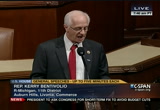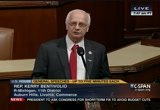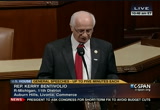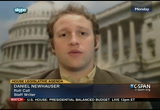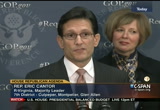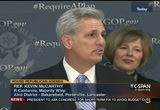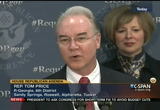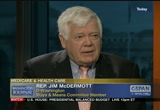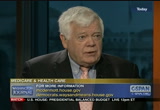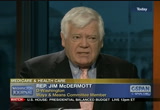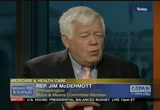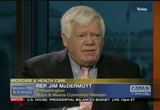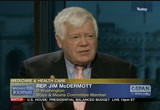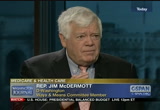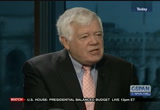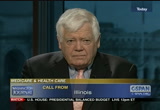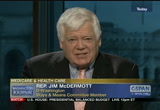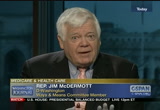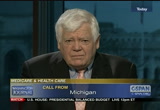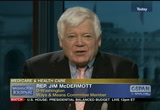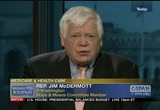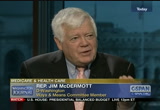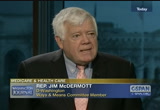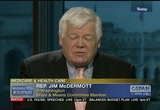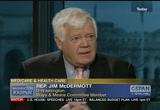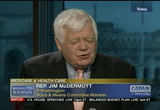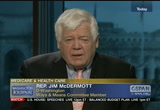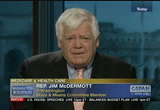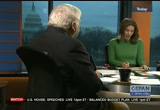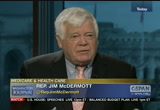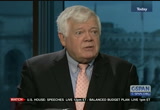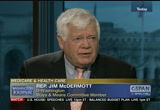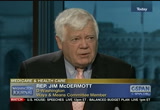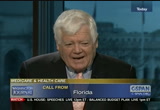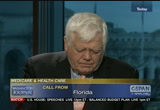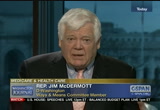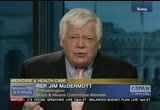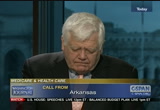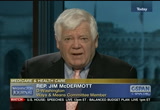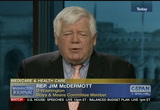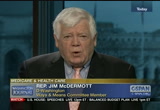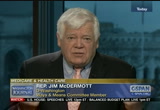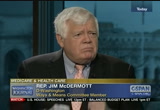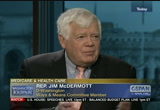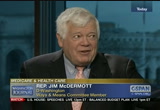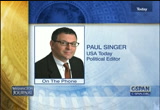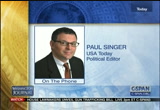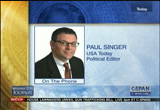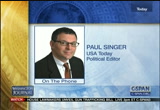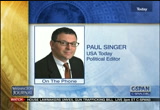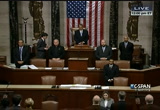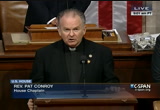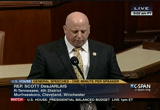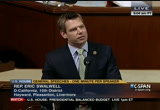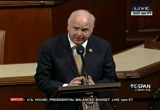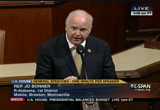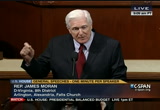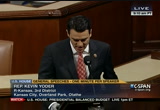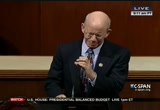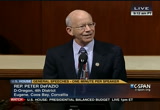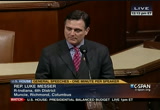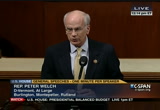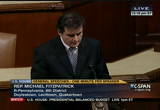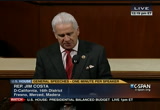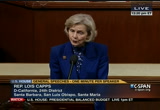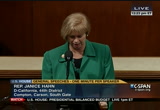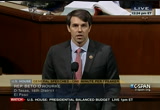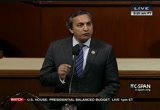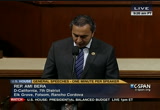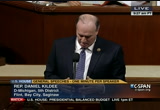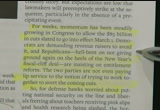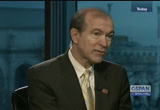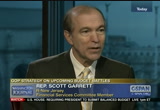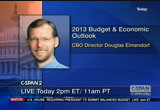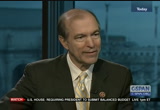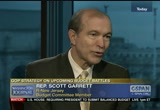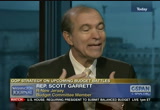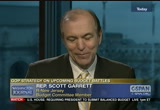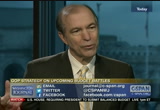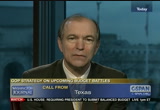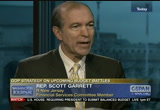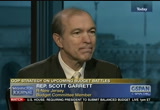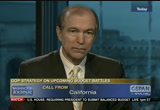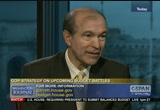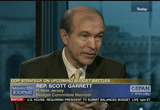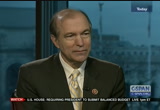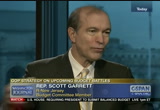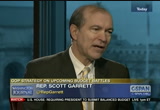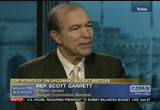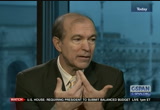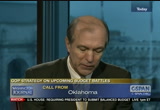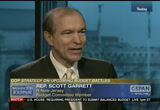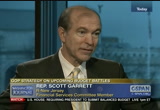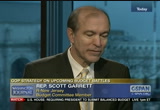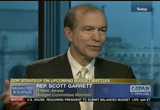tv Public Affairs CSPAN February 5, 2013 10:00am-1:00pm EST
10:00 am
afghanistan, but across the world is something that's rehabing a plan in two ways. a first of all, through cyber networks and we're having a kind of affiliation with it is based in washington, d.c.. they are providing the space for me to come and talk to you. >> thank you very much for talking to our viewers. i appreciated. >> the now. the chair lays before the house a communication from the speaker. the clerk: the speaker's room, washington, d.c., february 5, 2013. i hereby appoint the honorable steven m. palazzo to act as speaker pro tempore on this
10:01 am
day. signed, john a. boehner, speaker of the house of representatives. the speaker pro tempore: pursuant to the order of the house of january 3, 2013, the chair will now recognize members from lists submitted by the majority and minority leaders for morning hour debate. the chair will alternate recognition between the parties with each party limited to one hour and each member other than the majority and minority leaders and the minority whip limited to five minutes each, but in no event shall debate continue beyond 11:50 a.m. the chair recognizes the gentleman from oregon, mr. blumenauer, for five minutes. mr. blumenauer: thank you, mr. speaker. since i was a high school student i've watched the escalation of the war on drugs, especially marijuana. i slowly became aware of its widespread use. as a freshman legislator in oregon 40 years ago, my opinion was set by a hog farmer from
10:02 am
eastern oregon who was a state representative named stafford. stafford held the oregon house and the people crowded in the galleries spellbound with his tutorial on marijuana and its comparison to other addictive substances, both legal and illegal. this older gentlemen who didn't smoke, didn't drink alcohol, let alone use marijuana, made his case. he pointed out how tobacco was highly addictive and killed hundreds of thousands of americans per year. he discussed alcohol whose damaging properties had once led the country into a foolish, costly and ultimately self-defeated experiment with prohibition. alcohol use was damaging for some, led to dependency for many while contributing to tens of thousands of highway deaths every year. by the time the representative got to marijuana, he convinced the bill he was advocating to
10:03 am
have legalization, something i should advocate, something oregonians should be allowed this choice, less addicting than tobacco. we didn't legalize marijuana in 1973, though i was assured the 22 that voted for the bill had been supported bit people who used it by voted no, the measure would have passed easily. we did make oregon the first state to decriminalize the use of marijuana, possession of a small amount was made a minor infraction, treated like a traffic ticket. today, 40 years later, the case is even more compelling. 14 states have now decriminalized policies like oregon passed in 1973. in 1996, california pioneered the legal use of medical marijuana whose therapeutic qualities have long been known and employed. since then, 18 states and the district of columbia have
10:04 am
approved medical marijuana initiatives, allowing its use to relieve chronic pain, ann arboria and other conditions. nearly 2/3 of these approvals were the result of voter initiatives. last fall, voters in colorado and washington approved adult recreational use with 55% approval margins. studies show that a majority of americans now agree that marijuana should be legalized. it is time that the federal government revisit its policies. drugs with less serious classifications like methamphetamine and cocaine have more serious law enforcement, health and behavioral impacts, yet marijuana retains its schedule one classification. in 2011, 2/3 of a million people were arrested for using a substance that millions use, many more have tried, and a majority of americans feel should be legal.
10:05 am
because there are stark racial differences and incarceration, there are wide disparities in the legal treatment for communities of color versus their white counterpart. medical marijuana is widely accepted but subject to inherent conflict with federal law that is unfair, confusing and costly. a bipartisan group of legislators is developing a comprehensive package of legislation to clarify and reform outdated, ineffective and unwise federal policies. at a time of great fiscal stress and a sea change in opinion of voters, this is a unique opportunity to save money on enforcement and incarceration, avoid unnecessary conflict and harsh treatment of users, provide a framework for medical marijuana and even reduce the deficit. all by honoring the wish of 2/3 of americans to respect states'
10:06 am
rights for marijuana just like we do for alcohol. i would invite my colleagues to join this effort in developing a marijuana policy that makes sense for america today. the speaker pro tempore: the gentleman yields back. the chair recognizes the gentleman from north carolina, mr. coble, for five minutes. mr. coble: i thank the speaker. mr. speaker, january is the traditional month in which new year's resolutions are developed. i'm suggesting that president obama and mrs. boim adopt a resolution -- mrs. obama adopt a resolution. it appears to me, mr. speaker, regard air force one very casually and i believe on some occasions two planes, at least two planes go to the same destination. air force one, mr. speaker, belongs to president and mrs. obama.
10:07 am
but air force one also belongs to the american taxpayer. and i would welcome a new year's resolution that would provide generous lace of all future air force one dispatches with prudence, discipline and last but certainly not least fiscal austerity. america's taxpayers will be appreciative. incidentally, mr. speaker, air force one, designated by the air force as dc-25, incurs an operational cost per hour of $179,750, and on some occasions, additional aircraft accompany air force one by naturally adding to the cost. i'm going to now, mr. speaker, insert my -- that involve the former secretary of state, mrs.
10:08 am
clinton, during a recent senate hearing. a senator who was examining secretary clinton suggested or implied that the administration may have misstated the nature of the benghazi attack which mrs. clinton responded, what difference at this point does it make? i submit, mr. speaker, that the survivors of the four americans who were murdered at that attack would welcome any information, any and all information surrounding that infamous invasion. the survivors are grieving, and any information that could illuminate in any way this tragic -- the tragedy that occurred in benghazi would welcome any and all information, it seems to me. yes, secretary clinton, at this pount it may well make a
10:09 am
difference -- point it make well make a difference. i yield back, mr. speaker. the speaker pro tempore: the gentleman yields back the balance of his time. the chair recognizes the gentleman from massachusetts, mr. mcgovern, for five minutes. mr. mcgovern: i ask unanimous consent to address the house for five minutes and to revise and extend my remarks. the speaker pro tempore: without objection. mr. mcgovern: mr. speaker, i rise today to talk about the problem of hunger in america. we are the richest, most prosperous nature in the world, yet, the sad fact is that in 2013 more than 50 million people in this country are considered food insecure by the united states department of agriculture. food insecurity, mr. speaker, is a technical term for the hung hery. that's right. there are more than 50 people hung hery people in this country -- hungery people in this country. it's time we end hunger right now. millions of people either lost their jobs or saw their wages fall. food and energy prices went up for many middle and low-income
10:10 am
people. everyday costs like rent, utility and food became more difficult and in many cases families were forced to choose between food and electricity. even before the recession started, tens of millions of americans went hungry at some point during the year. that, too, is unconscionable. when we turn this economy around, and it will rebound, we need to end hunger now. we may not be able to wipe out all disease, we probably can't eliminate war, but we have the resources, we know what it takes. we need to muster the will to end hunger once and for all. hunger is a political condition. it's important to point out that even though 50 million people were food insecure, the vast majority had a safety net that prevented them from actually starving. that safety ned is called the supplement -- that safety net
10:11 am
is called snap. snap is a program that provides low-income families with food they otherwise could not afford to buy. more than 75 million families relied on snap to provide food for their families. it is a lifeline for these 47 million people who struggle to make ends meet. i don't deny this is a big number, but it's a big number because it's a big problem. mr. speaker, america's hunger problem will be dramatically worse without snap. just imagine what this country would look like if we didn't have the safety net that snap provides for low-income families in this country. our churches, our synagogues and mosques do their best to feed families who need help, but they cannot do it on their home. there are nonprofits and food banks that do as much as they can, but they cannot do it on their own. the private sector simply cannot meet the need. and with the economy not expected to fully recover for sometime, we know that there will continue to be those who struggle to afford food.
10:12 am
these are the people we need to worry about. the people we must help, the people who need their neighbors to lend a helping hand. snap, mr. speaker, is a helping hand. we lying on snap is no walk in the park. it is not champagne and caviar. no, mr. speaker. the truth is the average snap benefit is less than $1.50 per meal. there is a common misconception. people say it's a mischaracterization, that snap provides a culture of dependency. some talk about snap like it's a golden ticket, that getting on snap is like winning the lottery. everything is taken care of forever. give me a break. people don't want a handout. they don't want to rely on government assistance. no, mr. speaker, people want to provide for themselves and their families. that's why half of all new snap participants receive benefits for 10 months or less and 70% left the program entirely within two years. i don't know why there is such
10:13 am
opposition by some in congress. nor do i understand why people should balance the budget by cutting programs that would help the most vulnerable. people would go hungry because they are poor. 83% of families on snap make less than $20,000 a year for a family of four. less than $24,000 a year. i challenge anyone in this body to live off that income for a year. our budgetary problems are clear. we need to tackle the debt and the deficit, but we need to do so smartly and with reason. there is a reason why not a single deficit proposed from simpson-bowles to sequester cuts snap. that's because it's the most effective anti-hunger program that we have. that's because cutting snap will literally take the food away from families in this country. that's because the authors of these plans, were liberal democrats to conservative republicans all recognize the importance of this program. yet, there are those that would undermine this and other programs that provide
10:14 am
protection for those in need. it's time for a nationwide effort to end the scurnl of hunger. i call on the president of the united states to coordinate a white house conference on food and nutrition so we can devise a plan. i call on the leaders of congress to support such an initiative. we need to do more. end hunger now. end hunger now. end hunger now. mr. speaker, we can do this. we must do this. i yield back the balance of my time. the speaker pro tempore: the gentleman yields back. the chair recognizes the gentleman from north carolina, mr. jones, for five minutes. mr. jones: mr. speaker, thank you very much. i want to thank president obama for his nomination of chuck hagel to be secretary of defense. while we were home last week, i had the opportunity to watch the senate confirmation hearing, and i was dismayed by the way many of the republicans on that hearing chastised mr. hagel. mr. hagel is a man of integrity. i -- the question from one of
10:15 am
the senators about, do you think the surge worked, and senator hagel was such he didn't want to give him a direct answer. i would have said no, it didn't work. 1,200 americans killed. i don't know how many iraqis. look at the country today. it is totally falling apart. that was a question towards senator hagel. . the iraq war was very unnecessary. it was manufactured by the previous administration, and there was a marine general, greg newbold, who actually wrote an article in "time" after the war started and one of the points he made that i'm going to share with you, mr. speaker, is some of the missteps included the distortion of intelligence in the buildup to the war. the distortion of intelligence in the buildup to the war. in the history of washington, if ever our government needed
10:16 am
integrity, it's now. chuck hagel is a man of integrity. no one can question his integrity. i have had the privilege of knowing senator hagel since 2005 when i came out against the unnecessary war in iraq. senator hagel reached out to me and supported my position and encouraged me in my journey to find out the truth if it was necessary or not. his record speaks for itself. as a noncommissioned officer, he served honorably served this nation in vietnam earning two purple hearts, served on the senate committee on intelligence and committee on foreign relations, swels the president's intelligence agency. and the secretary of defense policy board. no one can argue chuck hagel's experienced. i know that chuck hagel is the right man to lead the department of defense through this very difficult economic time. he's a man that will uphold the constitution and do what is right for this country.
10:17 am
our military and the american people need chuck hagel to be the secretary of defense. mr. speaker, before closing i must say that in my many years here in washington of 18 years, i have never known a person with more integrity than senator hagel. and i hope that the senatelogical pass on the confirmation of chuck hagel to be the secretary of defense because america needs him, our military needs him, and it's time for people of integrity to step up and help us fix the problem facing our nation. and he will speak freely and honestly about what is needed to keep a strong military. i yield back the balance of my time. sara: the gentleman yields back. the chair recognizes the gentleman from illinois, mr. lipinski, for five minutes. mr. lipinski: thank you, mr. speaker. mr. speaker, i rise today in honor of national catholic
10:18 am
schools week. and to recognize the outstanding contributions that catholic schools have made to our nation. catholic schools week was celebrated last week in schools all across the country. as a proud graduate of a catholic grammar school and college prep school and strong supporter of catholic education, i once again this year introduced a resolution honoring catholic schools. h.res. 46 expresses support for the vital contributions of the thousands of calt lick elementary and secondary schools -- catholic elementary and secondary schools in the united states and the key role they play in promoting and ensuring a brighter, stronger future for our nation. i'd like to thank the 28 members who co-sponsored this bipartisan resolution with me. since 1974 the national catholic education association,
10:19 am
the united states conference of catholic bishops have organized and planned national catholic schools week. this year's theme, catholic schools raise the standards highlights recent initiatives undertaken by catholic schools across the country to strengthen the already exemplary standards. america's catholic schools produce graduates with the schools and integrity needed by our businesses, governments, and communities emphasizing a well-rounded educational experience in instilling the values of giving back to community and helping others. nearly every catholic school has a community service program. every year their students volunteers half a million hours to their communities. my own decision to pursue a career in public service was in part brought by dedicated teachers throughout my formative years in catholic schools. today over two million elementary and secondary
10:20 am
students are enrolled nearly 7,000 catholic schools. these students typically surpass their peers in math, science, reading, history, and geography in any a.p. test. the graduation rate for catholic high school students is 99%. 85% of graduates enroll in four-year colleges. rates well above the national average. as we continually hear the reports of our national test scores, these statistics are truly remarkable and should be commended. notably, the success of catholic schools does not depend on selectivity. catholic schools accept nine out of every 10 students who apply, and are highly effective in providing a quality education for students from every socioeconomic category. especially disadvantaged youth and underserved urban communities.
10:21 am
over the past 30 years the percentage of minority students enrolled in catholic schools has more than doubled. and today they constitute almost 1/3 of all catholic school students. in times of economic hardship, catholic schools provide an affordable alternative to other forms of private education. now, in addition to producing well-rounded students, it is estimated that catholic schools save taxpayers over $18 billion annually. the importance of these savings is undeniable as we in congress and lawmakers across the country struggle with budget deficits. i was born and raised in the chicago archdiocese where more than 87,000 students attend 250 schools. in the joliet diocese, 22,000 students are educated in 48 elementary, and seven high
10:22 am
schools. in my district alone, there are nearly a dozen catholic high schools and more than 50 grammar schools. including one of the best in my home parish of st. john the cross in western springs. which last year was named the national blue ribbon school by the department of education. the focus of this year's catholic schools week, catholic schools raise the standards, demonstrates the continued commitment to excellence. the national catholic education association has launched an initiative called the national standards and benchmarks for effective catholic elementary and secondary schools. which will make sure that students are consistent -- that standards are consistently high across the country. the dedicated teachers and administrators who work at catholic schools, many of whom could earn much more elsewhere, are instrumental in upholding these standards. in recognizing catholic schools week, we pay a special tribute
10:23 am
to professionals who sacrifice so much for their students. during catholic schools week last week, i visited several schools in my district, including st. dennis in lock port, st. alphonse, and others, mr. speaker, i hope my colleagues will join me today in honoring catholic schools and all they contribute to our nation. the speaker pro tempore: the hair recognizes the gentleman from nevada, mr. heck, for five minutes. without objection. mr. heck: mr. speaker, i come to the floor today to bid a solemn and respectful farewell to mr. romeo berras. residents of southern nevada and members of the las vegas mighty 5, a group of filipino american world war ii veterans denied benefits and recognition for their service to the united states. romeo volunteered for the philippine army at age 17 and
10:24 am
served in the infantry as a guerrilla fighter. he earned a purple heart for wounds sustained in action and received an honorable discharge. romeo passed away last month at the age of 85. sylveria served under army colonel ramsay of the 26th cavalry. it was this unit that made the last horse charge in cavalry history on january 16, 1942. after his discharge, he took up the cause of his fellow denied veterans and fought for their compensation ever since. that fight ended two weeks ago in las vegas. he was 100 years old. he they along with their countrymen fought and in instances died in the command of american troops in the pacific theater in world war ii. after helping the allies win the war in the pacific, many of these veterans began seeking the benefits promised to them by president flange lynn
10:25 am
roosevelt. but -- franklin roosevelt. but on february 18, 1946, president harry s. truman signed the rescission act of 1946 into law which denied over 200,000 filipino world war ii veterans the benefits promised to them five years earlier by president roosevelt. congress finally acknowledged the dedicated service of many of these he denied veterans when it established the filipino veterans equity compensation fund in 2009. but many of these veterans, as many as 24,000, still have not received compensation due to bureaucratic hurdles and paperwork shuffles over the types of records they told verifying their service. the mighty five is now reduced to two with the passing of romeo and sylverio. i fear many more will pass without ever obtaining the recognition they deserve if this body does not act to remove the barriers preventing these veterans from receiving the benefits they have earned.
10:26 am
yesterday i introduced legislation to ensure that the remainder of the mighty 5, and denied filipino veterans everywhere, finally receive the benefits promised to them so many years ago. my bill, mr. speaker, is very simple. it directs the department of the army to certify the service of any filipino world war ii veteran whose name appears on the approved, revised, reconstructed guerrilla roster or certified documentation from the u.s. army or philippine government attesting their service. simply put, these men fought so the allies could defeet the japanese in the pacific. if they could show they fought, let's fulfill their promise to them so they could live out their years knowing the united states has officially recognized their service. i have met with them many times in las vegas. all they want is to be recognized. it's not about the money to them. they want to know that their service was appreciated, that their sacrifices did not go unnoticed. as i attended the funeral last week, no flag draped his casket.
10:27 am
no honor guard was present. and there was no playing of taps. there was no official recognition of his dedicated military service. and that, mr. speaker, was wrong. i'd like to thank my friends and brother veterans for their service to our country, their passion and dedication to this cause will be missed. mr. speaker, i urge my colleagues to join me in fighting to ensure these honorable world war ii veterans are appropriately recognized and yield back the balance of my time. the speaker pro tempore: the gentleman yields back. the chair recognizings the gentlewoman from florida, ms. wilson, for five minutes. ms. wilson: thank you, mr. speaker. afraid, the world has coined to speak internationally about
10:28 am
violence, abuse, rape, assault, and disrespect of women. women like our mothers, grandmothers, sisters, aunts, nieces, friends, and most especially, our children. gender-based violence permeates the world. generally in far away countries. far from the civilized democratic world that we communicate with. to the women of this congress and the women of the world, take a moment to imagine trying to survive without a response from the police, without the ability to press charges, and being able to actually speak day after day if you are a victim of gender-based violence. contemplate life without exaccess to medical care, to address your physical, mental, and emotional trauma. imagine having nowhere to hide.
10:29 am
this scenario sounds like 100 years ago and a world far from our country, but in reality it is just a two-hour flight away from my congressional discontribute -- district of miami, florida. it actually describes gender-based violence in haiti. but through smart policy and the strength and courage of haitian women, it's a reality that's within our power to change. the 2010 earthquake in haiti brought a striking increase in incidents of gender-based violence. nearly half of the victims are girls under 18. in many cases involves the use of weapons, gang rape, and death threats for seeking help for authorities. these threats, coupled with the lack of police presence and equipment, hurts the integrity of haiti's legal system and denies women and girls their basic dignity.
10:30 am
the national penitentiary was destroyed in the earthquake, freeing hundreds and countless violent prisoners who now rome the streets -- roam the streets. through the determination and grace of the haitian people and smart assistance from the obama administration, an international field some change is coming to haiti. . jobs have been created, schools have been built, yet, gender-based violence remains severe. today i'm introducing a resolution calling attention to the plight of haitian women and children and calling for action on their behalf. with the strategy to prevent gender-based violence, the obama administration is on the right track. congress and the administration must ensure robust funding for
10:31 am
these initiatives, including the u.s. agency of international development, gender equality and female empowerment policy to meet the continuing need. for me, this issue is personal. i've seen the tent cities firsthand. i have spoken with the women. i have counseled the victims and witnessed the scars of indignation and pain. i feel the anguish in my bones. but i also feel the hope. let's work together to ensure that no woman in haiti, no woman in this hemisphere or in this world has to bear the indignity of sexual violence. thank you, mr. speaker. i yield back the balance of my time. the speaker pro tempore: the gentlewoman yields back. the chair recognizes the gentlewoman from north carolina, ms. foxx, for five minutes. ms. foxx: thank you, mr. speaker. the constitution of the united states of america was written
10:32 am
to put in statute the limits of government's authority over citizens. it does not bestow rights or permit freedoms upon american people. rather, it delimits what government of the people, by the people and for the people can and cannot do. since well before our country's founding, americans have exercised the right to keep and bear arms, a right formerly protected by the ratification of the second amendment in 1791. as a life-long defender of second amendment freedoms, i am committed to ensuring that any new proposals considered in washington do not infringe upon the constitutionally guaranteed right of law-abiding citizens. in the wake of devastating tragedies, well-meaning people feel compelled to do something, and the government likewise to intercede. but good intentions don't often
10:33 am
make good or constitutional laws, and they certainly are no match for those set on being lawless. the second amendment reads, a well-regulated militia being necessary to the security of a free state, the right of the people to keep and bear arms shall not be infringed. if the text alone were not explicit, our founding fathers clarified the purpose of the second amendment. james madison wrote in federalist number 46 that americans possess the, quote, the advantage of being armed over the people of almost every other nation whose governments are afraid to trust the people with arms, end quote. even more applicable to our current situation is this excerpt referenced by thomas jefferson which reads, quote, laws that forbid the caring of
10:34 am
arms disarm only those who are neither inclined nor determined to commit crimes. such laws make things worse for the assaulted and better for the assailants, end quote. the rush to action in the wake of tragedies sadly heaps the price of criminal wrongdoing onto law-abiding responsible gun owners. when such is the case, government flirts with construing the desire to exercise second amendment rights as suspect behavior. it deems some second amendment utilities superior to others and it ignores the root causes of mass violence, focusing instead on the means by which violence is accomplished. those mistakes must never be made. federal proposals must be well thought, data-driven and constitutionally sound.
10:35 am
the right to keep and bear arms is not one for hunters and sportsmen alone. for centuries it has been a right for every american citizen to arm themselves to defend their property and the people they hold dear, and it is a right that cannot be infringed. i yield back. the speaker pro tempore: the gentlewoman yields back. the chair recognizes the gentleman from virginia, mr. connolly, for five minutes. mr. connolly: thank you, mr. speaker, and i can't resist by saying the second amendment right does not preclude background checks to protect the very people we represent. mr. speaker, the supreme court ruling last summer on the affordable care act was a victory for all american families and small businesses, especially, by ensuring that our constituents have access to affordable quality health insurance. the ruling preserved the integrity of medicaid partnerships between the states and the federal government, giving governors the
10:36 am
opportunity to accept to pay the cost for expanding low-income residents who might otherwise not have access to health insurance. though, some of my republican colleagues remain opposed to the act, i'm pleased to see republican governors, including those from nevada, new mexico, arizona and now ohio putting policy ahead of politics to support this expansion of medicaid. those governors have acknowledge that they were motivated not only by the desire to reduce the number of uninsured but also by the compelling business case. medicaid expansion is part of the vision for new continuum of coverage that will begin in 2014 when the major provisions from the affordable care act takes effect. this will fill the long-standing gap in medicaid coverage for low-income adults by expanding eligibility for those earning up to 133% of the federal poverty level. as of 2011, there were 48 million nonelderly uninsured in
10:37 am
america. as an incentive for states to expand coverage for those folks, the a.c.a. commits the federal government for paying 100% of additional costs for covering them, and after 2016, 90% thereafter. i wrote the republican governor of my state and the general assembly membership urging them to join us in extending this critical health care coverage. the virginia general assembly is currently divided on the matter, but i was encouraged last week by the announcement from our republican lieutenant governor who said there is no state better prepared to move forward with this reform and the coverage expansion of it than the commonwealth of virginia. like me, lieutenant governor bowling understands the economic benefits for virginia. expanding medicaid will help 300,000 virginiaans get access to health care -- virginians get access to health care
10:38 am
coverage who currently have none and will help them. the cost of going to the emergency room is borne by hospitals and those who are insured through their premiums. the governor's advisory commission on health reform said expanding medicaid, coupled with other reforms in the act, will reduce uncompensated care in virginia by more than half. under the affordable care act, virginia would receive more than $9.2 billion in the first five years. a recent state analysis shows that during that same time period, virginia would actually save $300 million by expanding coverage. and virginia's cost on the first 10 years now estimated at $137 million are considerably less than originally estimated and a great return on that investment. time is running out, and our residents cannot afford for states to miss this opportunity. in fact, i believe they will be
10:39 am
making such a historic mistake that i am proposing an additional incentive to help motivate those governors might not still be convinced. this week i introduced the medicaid expansion act. it has a use it or lose it provision. we'll ship those dollars to other states who are willing to partner with us to help the cost and expand their coverage. just so the residents of a particular state are fully aware of thousand their governor's decision is affecting them, my bill will require h.h.s. to publicize the list of states not partnering with us, giving up this opportunity and the amount of money their governor has left on the table and the number of uninsured who will thereby not be covered. the affordable care act is the law of the land, and residents of any state should not be penalized because of their governor's ideological agenda. the choices we face are tremendous. we will -- will we move forward together to implement those historic reforms and reverse
10:40 am
the unsustainable trajectory of spiraling prices or will we slip this -- hor will we realize savings and spur economic activity? i hope more economic governors, including my own, will follow the lead of their colleagues elsewhere and put citizens' health ahead of partisan orthodoxy. i yield back. the speaker pro tempore: the gentleman yields back the balance of his time. the chair recognizes the gentlewoman from tennessee, mrs. black, for five minutes. mrs. black: thank you, mr. speaker. in the year 2000 congress created the u-visa program as a way to allow illegal immigrant crime victims and temporary, a temporary legal status in order to assist in law enforcement in the prosecution of their assailant, which has helped bring thousands of criminals to justice. however, over time the u-visa has become a pathway to citizenship for essentially everyone who applies.
10:41 am
the rampant abuse of this program is detrimental to law-abiding individuals who seek to integrate to our country through the proper legal channels. we are a nation of immigrants, and we are also a nation built upon respect for the rule of law. our heritage and our principles demand us -- demand of us the courage to reform our broken immigration system so that those who follow the law and want to contribute to the betterment of our nation will have the opportunity to do so. that is why i have introduced the u-visa reform act of 2013 to stop abuses in the u-visa program. i urge my colleagues to join me in support of this commonsense piece of legislation. thank you and i yield back the balance of my time. the speaker pro tempore: the gentlewoman yields back. the chair recognizes the gentleman from georgia, mr. scott, for five minutes. mr. scott: thank you, mr.
10:42 am
speaker. i rise today to bring note to the fact that for the fourth time in five years president obama has once again delayed in bringing his budget to the congress and the american people. people say that our national debt is unacceptable. they tell me it is holding america back of economic prosperity and robbing their children for a dream. the president has turned a deaf ear on the pleas of these americans. he's been asked to take this country's economy seriously. he's chosen to spend his time in other countries, taking family vacations and playing countless games of golf. hardworking taxpayers know that work must come before play, mr. president. americans must forfeit their own vacations due to the uncertainty in the economy.
10:43 am
while the president crisscrosses the world, avoiding the priorities back at home, americans are nervous. every year our country goes without a budget the national debt sky rockets, the uncertainty of american businesses grow and with that unemployment goes up. without a federal budget, business owners cannot plan, they cannot plan for the president's new regulations or his tax increases and therefore it is all the more difficult for them to expand their businesses and create jobs in america. to add to the uncertainty, the president's proposed sequestration is set to take effect this march. despite his promise, his promise to the american people that it would never actually happen, the president has yet to take any steps to undo this harmful measure. he has shown absolute indifference to the millions of americans whose livelihoods will be severely impacted by his sequestration. house republicans have twice passed legislation to replace the president's sequester with commonsense reforms that will reduce spending, preserve and
10:44 am
strengthen our safety net for generations and preserve our national defense. this week the house will pass a budget but it will be a responsible budget that will balance. one that will aim to grow the economy, drive down unemployment, expand opportunity and prosperity for the private sector and ensure that america maintains its leading role in the world as a strong national defender. americans can do this. we just need a president to put work before play. thank you, mr. speaker. i yield the remainder of my time. the speaker pro tempore: the gentleman yields back. the chair recognizes the gentleman from michigan, mr. bentviolio, for five minutes. mr. bentviolio: thank you, mr. speaker. thank you for allowing me to speak today. i have said it before and i will say it again. the job of the congress is to protect the rights of the american people, not take them
10:45 am
away. i want to explain what i mean by that. they are outlined in our declaration of independence, life, liberty and the pursuit of happiness. these rights were not given by a king or developed after extensive debate by a congress. they come from god. they exist in the same way that gravity exists. they are natural. but too often gets left out is why we must protect those rights and why those rights are still relevant today. . the ripe is simple and as practical today as it was in 1776. we protect those rights because in america we know that freedom leads to prosperity. our country was built by forefathers who believed in and defended that idea. every generation that came after them was -- has followed their lead. rising to tackle whatever challenge came before them in order to protect the freedom of this nation. every american generation has left the country a little better off than they found it
10:46 am
and handed it to their sons and daughters with the hope they would do the same. thinking both about those who came before us and those who will follow us long after we are gone is in the very d.n.a. of our country. that's why our constitution's preamble explicitly states that it doesn't secure liberty for just the founding generation, but also for prosperity. generations don't simply disappear, instead like an aging photograph, they kind of fade away until they are all gone. right now one of america's greatest generations is doing just that. in world war ii, hundreds of thousands of americans risked their lives on battlefields half away -- a half a world away while the rest of them worked and sacrificed at home to make sure our troops had everything they needed. the reason they acted so valiantly was because they understood the truth to american exceptionalism. that freedom leads to prosperity.
10:47 am
they knew it and they fought for it because it had been passed down to them from their parents who had received it from their parents and so on. to them it was something worth fighting for. it was worth making sacrifices for. it was worth dying for. not a day goes by where i don't think about their sacrifices and remember what they did for me and everyone else in this great country. they deserve to be taken care of. that is why i urge my fellow members of the house from both parties to join me in supporting the full faith and credit act. as we work to secure the government's addiction to debt, we must ensure that the greatest generation is protected. they have already made their sacrifices in the defense of our ideals. they have already passed down freedom to us and given us a country that is better off. we cannot be the first generation to fail america. we must follow the path of our founding fathers by preserving the american dream for our children and grandchildren.
10:48 am
one great idea to preserve our great nation was developed by our speaker, john boehner. in the days before the midterm elections of 2010, speaker boehner proposed taking a different approach regarding how congress voted on budgets. he he maintained rather than having a comprehensive budget that encompasses all or at least most of government appropriations, the whole congress should treat every budget for each federal agency as an independent spending bill. he said, members shouldn't have to vote for big spending increases at the labor department in order to fund health and human services. members shouldn't have to vote for big increases at the commerce department just because they support nasa. each department agency should justify itself each year to the full house and senate and be judged on its own. that is the kind of leadership that americans across this great land support. those are the types of ideas we need to enact in order to take
10:49 am
on the challenges that are ahead. i urge my fellow congressmen to appeal to the better angels of their nature as we spend the great -- next few months talking about our government's addiction to debt. let's solve this problem. thank you. i yield back. search the gentleman yields back. -- the speaker pro tempore: the gentleman yields back. pursuant to clause 12-a of rule 1, the chair declares the
10:50 am
>> lawmakers are back this week from a district court time meeting with constituents. what is on the agenda this week? >> the only bill they are going to be voting on it is one that will require the plan act sponsored by tom price. sources have told me the idea came out with meetings with the majority leader and a round table. it would require that when the president submits his budget to congress, which was supposed to be due today, when he does that it will identify a year with the budget.
10:51 am
if he does not identify the year, he would have to go back and submit a second budget. for that to go into affect the senate would have to pass it as well. in would not happen with a bill like this. it'll send a message. >> house republicans are saying this is necessary. why is that? >> the president and his first term was late in three out of four. he missed the deadline. they say they want to make sure that there is some sort of fiscal responsibility coming out of the white house. they want to balance the budget. they have identified a goal of 10 years to balance its. even though the paul ryan to more than 20 to balance. they want to put the president on the record as saying it is this way and by this time. >> what are house democrats thing about this bill? will they vote in favor? >> no.
10:52 am
i would be surprised. some of the other fiscally conservative democrats might consider voting for this is because it would go pretty well in the districts. i would venture to say the vast majority of democrats think this is a gimmick, and this is something that is more of a messaging build than a substantive bill. i doubt we will see too much support from them. >> house democrats have private party meetings outside the capital scheduled for later. what kind of issues are likely to come up? >> the democrats are meeting in leesburg. it is the same kind of thing republicans did a couple of weeks ago. they meet every year into a stand-up of the party. what is our role of? power we going to work with the president? how are we going to work again house republicans?
10:53 am
in the meantime, at the conservative republicans are meeting in baltimore at the same time this weekend's to meet with the heritage foundation retreat. we will have all kinds of sessions talking about how the conservatives will exist as a unit. there is a lot of soul-searching going on. >> what other legislative issues comice the republicans take up? >> we have to deal with sequestration and resolutions that will expire next month. we have a lot of big ticket fiscal issues looming. i would expect that something that would deal with those would come up. paul brian is putting the budget itself together. we will have that in april or so. as well as competing budget blueprints from democrats, republicans said the committee.
10:54 am
>> you can read this work. thank you for being with us. >> thank you. >> the house later today with the bill requiring the president to submit a proposal to balance the budget, house leaders spoke with reporters, talking about this. did the president of this afternoon will ask congress to come up with tens of billions of dollars in short-term revenue. here are the leaders from earlier today. >> it feels the same. high unemployment. rising prices. more debt for our kids and grandkids. a government spending creates economic growth, we should not be having any of these problems at all. solving problem starts with what every family does every month. they have got to have a budget. the budget is late again. democrats have done a budget of
10:55 am
nearly four years. none of them have a plan to replace the sequester. that is why republicans badged been no rabbit -- caskey no budget, no reform act. it would require the president to submit a plan that would balance the budget. the sooner we saw are spending problem, the sooner our jobs problem will go away as well. >> good morning. i want to thank tom price for bringing forward the require a plan act. it says to the president, please join us in doing as your job. we will continue to put forward a plan that manages to cut down the deficit 10 years. we want to see how long he thinks it should take to balance the budget and how he is going to do it. all of us are here trying to
10:56 am
improve the budget for all americans. the way to do that is to get our work done here. and see how it is that we can make their life better going into the future. >> with our trillion dollar deficit, one thing the american public expected is a budget. the budget act of 1921 requires that the president some at a budget on the first monday in february. he has had five opportunities to do it. he has missed the deadline. if any of our baseball fans, that is adding to under average. you know he is now just a mendoza line. it is about mario mendoza, and the line you talk about a player if they come incompetence. the american public expects
10:57 am
more and more accountability. >> yesterday it was mentioned at the president for the fourth time out of the last five years failed to meet his legal requirement to submit a budget to congress. the president and the senate democrats are failing on what is really the most fundamental part of governing. the fundamental responsibility in governing, which is budgeting. if not, washington suffers. it is a hard-working americans. it is the moms. did the dads. did the recent college graduates that cannot make decisions to move forward. when washington is the biggest obstacle to economic growth we have a problem. we are not going to have people who know how to make hiring decisions will be able to move forward until there is a budget in place.
10:58 am
households understand that if you do not have a budget you are going to fail. washing, d.c. and the federal government is in the same boat. this will require the president to lead the american people know when he plans to balance the budget. it is the first steps to not only getting our fiscal house in order but allowing our economy to move forward some people can make decisions to invest and have their businesses succeed. >> most americans know that when it comes to the safety and security of their families, a series of plans are required. that is why when my family was young we called a family meeting and discussed what we would do in the event of a fire at night. my son was born at the time. his plan was he always wore his superman pajamas to bed complete
10:59 am
with a cape. his plan was to karate chop his window out and write his superman cape down to the brickyard and he would meet us there. we came up with a more serious plan to save his life. if you listen to adam ramallah, the former chair of the -- admiral mullen, the former chair, the biggest threat to the cities is national debt. it'll be good to have a group of adults that have come up with a plan to address this issue. we put forward budgets that show the american people how to balance a budget. we will do so again this year. we challenge the senate democrats to do the same. they have not prepared a budget in for years. we of the president takes off
11:00 am
his superman kate and -- cape and scent of a serious plan. serious times require serious planning. >> we are the minority party in washington. we are the majority in the house, but we do not control the senate and the white house, because one of the responsibilities of the minority party is to hold a majority toecap and provide a contrast. two weeks ago we passed a bill to force the senate to adopt a budget, to hold them to account, and allow for a contrast for the american people to see. this week i am pleased to join the leadership in putting forward the require a plan act that requires the president to put a plan in place to balance the budget in a 10-year time,
11:01 am
but if you do not, tell us when it does come out tell us when it balances. and businesses must plan for a balanced budget. it is time to the presenident to step up. put forward a budget entellus when it will be balanced. >> in indiana, we have had a balanced budget for the last seven years. it takes leadership, courage, and a plan. to do it, the president and senate democrats have got to stop pretending, start meeting with the plan, because we know with leadership and courage with a plan, it can be done. the require a plant at is all about common sense. like the super bowl, athletes have plants.
11:02 am
families have plants, whether a retirement plan, helped plan, whether an education plan for their families. businesses have strategic plans. right now our country does not have a plan, and america deserves a plan. the facts speak gladly. the senate has not pass a budget in four years. the president missed his deadline again, and it is time for the american people to get what they deserve, a credible budget plan. every dollar the government spends is a dollar that somebody else hard, so let's earned the respect of the american people by giving them a spending plan, and i am proud to be here with leadership and the house republicans to turn our challenges into our biggest opportunities. the require a plan act is about planning, and not
11:03 am
attending. >> house leaders for about an hour ago talking about the so- called require a plan bill, which requires the president toured submit to congress a plan to balance the budget over the next 10 years. the house will gavel in in about an hour. in the seventh, they are off today, so members can attend the annual party retreats. when they return on thursday, senators will work on reauthorizing the violence against women act that it's part -- that expired in to us alive. also live today, at 1:00 p.m., eric cantor of virginia will give a domestic policy speech at the american enterprise institute. that will be on c-span2. at 2:00 eastern, congressional budget officer douglas amador will present projections -- elmendorf will present
11:04 am
projections. also, a gun trafficking legislation news conference on c-span3 at 2:00 eastern. >> julia left her time in the white house. she sat in her memoirs and was like a bright and beautiful dream, the most wonderful time of my life. i think that gives you some idea of how much she enjoyed being first lady and how much she felt that her husband had finally achieved the recognition he deserved. >> julia grant, who married u.s. grant. "first ladies," their public and private lives, there and listen -- their influence.
11:05 am
beginning february 18 at 9:00 p.m. eastern on c-span, c-span radio, and c-span.org. >> afternoon, the president will ask congress to come up with tens of billions of dollars in short-term spending cuts and tax revenue papaw off the automatic across-the-board cuts scheduled to kick in in march. budget and the date from this morning's "washington journal." host: we are back with congressman mcdermott, the ranking democrat on the house subcommittee. let me read to you from "the national journal bailey," and what they had to say about sequestration -- national journal daily," and what they had to say about sequestration.
11:06 am
host: true, accurate reporting? caller: -- guest: as far as what i can tell, that is exactly what is happening. unfortunately for the american people, the leadership on the republican side is still acting as though the election never occurred. they have got to except that the people have said that they once what obama is doing. they reelected him overwhelmingly. and they have to work to make that happen. unfortunately, they are still trying to block things. we have kicked the fiscal problems down to the end of march and i suspect we will kick them down to the end of june. we will just keep doing this
11:07 am
and never get to the real problems that face this country. host: why not come to an agreement on this? this editorial from "usa today," saying that even if the sequestration happened, it would barely even touch the government's borrowing trajectory. guest: first of all, the republicans need to admit that this is not a spending problem, it is a revenue problem. they paid for two -- they put up two wars that we never paid for. they are simply willing to spend money. they gave tax cuts and never
11:08 am
paid for them. in the end they have eroded the revenue of the government. some of it is coming back. the wars are winding down. the economy is picking up. but there is a real health care problem that we have to deal with at some point. it will take some revenue. you cannot just do it by magically saying that it will fallout of the sky. you cannot cut enough to get the debt down without talking about revenue. i think it they did a little bit here at the end of january 3. everyone gave the office and will not give again. host: this editorial from "usa today," de say that it is not a spending problem -- but "usa today," others, saying that it is. guest: let me explain.
11:09 am
the average cost spent on a senior citizen in medicare is flat. it went up 0.4% last year. it is flat spending. the fact is that beginning in 2011, all the children born after the second world war, the so-called baby boomers, are coming on. when i came to congress in 1989 there were 35 million seniors on medicare. 30 million people altogether. -- 40 million people altogether. on to medicare. we simply have got to deal with the fact that the population is going to need more spending. it is not that spending is out of control, but republicans, what they are saying is that they want to do is keep them from getting on to the program. that is why they want to talk
11:10 am
about raising the retirement age from 65 to 72 or 80. that would really solve the problem for the government, but not for the senior citizens or the american people. they would still have to find a way to cover their health-care costs. what they would do is do what they did before medicare. turn to their children. your mother or father would come to you and say -- i have no money to take -- to go to the doctor, can you take care of this bill? that is what happened before 1964. now they are saying they want your mother to be 75? from 65 to 75? they are not saying that, but if you look at what is going on, democrats are simply not willing to do that. we are going to find the money to cover all of the senior citizens in this program at 65. host: no cuts and but -- no cuts to benefits, democrats will
11:11 am
stand by that? guest: democrat -- benefits are rising. benefits are not rising. we have provided a number of revenue -- host: to the doctors. guest: hospitals, doctors, providers, there are all sorts of ways to save money. it is saying to doctors -- be more efficient. the united states spends 18% of their gross domestic product on health care. in france they spend 11%. in germany it is 12%. we are spending way more and do not have everyone covered. is an inefficient system and it is the inefficiency that needs to be driven out. right now there is an incentive where a doctor gets paid more if he does more. that is the wrong incentives. the incentive should be that
11:12 am
you get paid more if i keep you healthy and that does not mean doing more tests or x-rays or anything else, it means understanding your disease and managing it affectively. -- effectively. host: john boehner came to the floor yesterday. talking about president obama and the budget, here is what he had to say. [video clip] >> the president believes we should not be having these problems. maybe then it would not be so disappointing that his budget is late. well, we are having trouble in large part because spending is the problem. it chases jobs overseas and causes anxiety about the future. one example about something the president's budget could have address is the sequester. that is washington speak for automatic spending cuts.
11:13 am
this was first proposed by the president in 2011, insisting that it be part of the debt limit agreement. the house has passed legislation to replace the sequester with common sense reforms to preserve and strengthen our safety net for future generations. host: congressman, your reaction? guest: first of all, when you have the problem but he had, until the third of january it is very hard for the people of the white house to put a budget together when they cannot get resolution on the issues at the last minute. the fact that it has drifted over a few days, it will come out in the next week or so. that is no catastrophe, not the end of the world as we know it. really, it is directly related to the extension that we went through during a lame-duck session.
11:14 am
you should not word that use cut -- you should not use that word, spending and spending. he never talks about what we spend it on. he never says that the wars were a bad idea or that the giving of tax rates was a bad idea, or that medicare part b, the drug benefit without paying for it was a bad idea. he just says that they were spending too much. they were in charge when those things were put in. now they need to put on the table what they want to cut back. they want to cut the military and make this across the board slashing out of everything. that is nonsensical. you should know what you are cutting. i believe in surgery, not a meat ax. host: on medicare, what would happen?
11:15 am
guest: an interesting question. no one has given us what they would cut out. 10% of the patients getting paid for? doctors getting 10% less? there is no specificity. you can sit here and talk -- we should just cut across the board. let's talk specifically about how it affects -- they will not come to the table and -- you see, this test to start in the house. constitution makes this a house responsibility, not a presidential responsibility. if they want to do that, lay it on the table. let me see the specifics of what you want to cut. then we could have a discussion. host: all right, carl, chicago, let's get the viewers involved. carl, go ahead.
11:16 am
caller: power you, greta? host: good morning. caller code to make two points -- caller: to make two points, we can afford it. second, we have been going through 20 years of trickle- down economics. the prosperity in the country was measured in dollars and could be anywhere from one quarter of $1 trillion per year to $1 trillion dollars per year. according to david stockton, only 10% of americans share their prosperity. we have the money in this country to do these things, we basically just -- i am not trying to put this on
11:17 am
republicans, the economics we're following right now, these economics, they are around the world benefiting from this. we have to do something about taking this out of the health- care system. guest: i agree with your analysis. we have the money in this country to pay for health care for all of our senior citizens. there is no question that we have the money. if the swedes, the germans, and the italians can do a, the united states can do it. anyone who says that we cannot is down selling america, far as i am concerned. there is a question about the revenue.
11:18 am
when george bush came into office, he had a surplus. he was worried about a surplus. he began to give tax breaks. the original tax breaks of george bush, along came 9/11, then you were into war in afghanistan. and these are all things that we did while we look at where the money was coming from. we can do anything he want to. fairly. it is not fair right now when the top .10% of 1% is accumulating money at a rate
11:19 am
that is unbelievable for those of us in the lower half of the economic ladder. the number one cause of bankruptcies in this country is healthcare bills. the average american is scared to death that they will get sick and they will not be covered. we have inequities that we could fix with the tax structure. it is a matter of political will. host: edward. caller: thank you for taking my call. representative, i have been around for a while, and george bush did not inherit a surplus. it was on paper. as far as him going along with spending programs, i do think he was trying to appease the
11:20 am
democrats. i thought it was wrong then. when obama went into office, he upped the government agencies, doubled, tripled their budgets, and now you do not want to come to a fair and equitable conclusion. you want to say it is the revenue. how about all government agencies, all employees go to a flat $82,000 a year? -- $52,000 a year? thank you. guest: we could spend much more time talking about the economic situation george bush inherited. the fear was the united states would have no debt and wall street said that was a bad situation.
11:21 am
that is why he gave away the tax breaks in 2000 when he came in. you want to keep a certain amount of debt in the economic system so that we can trade paper in other countries for borrowing money. that whole system was thrown off by the fact that two wars were not paid for and we did not pay for the tax cuts. they were given away as if we did not need them. it was part of the surplus. the business about going to $52,000, i am not sure why you would pick that number, but in a society where we want people to have a living wage, $52,000 is a real struggle to rid there are people making $52,000 -- struggle. there are people making $52,000 that are struggling.
11:22 am
that is a soviet answer. i am not sure how you come up with $52,000. why? host: entitlement spending, if you could, if you support it or not, raising the eligibility age, you say you are not open to that. guest: we already have a means testing, but one of the dangers of doing that is if you make it so tough, people would say why should we have the program? i am not benefiting from it. we want a program that covers everyone in the country. it is a social insurance program. if you are rich, we do not say the fire department will not come put the fire out. on police and roads we do not means test.
11:23 am
we do not say if you have a lot of money you have to pay $25 every time you backed out of your garage. that is not how society works. host: health-care entitlements could require more out-of- pocket from patients. guest: the average senior is spending $3000 a year, not paying for eye glasses or hearing aids. they are paying for a lot. they are averaging $5,000. it is easy for a congressman to talk with an idea like that, but when you think about senior citizens living under $40,000, and that is the average, how do you say you should pay more than $5,000? you should find ways to make it more efficient. host: the formulas used for cost-of-living increases could
11:24 am
be tweaked to make the raises slightly less generous. guest: that is an interesting idea. it costs what it costs. if you and i throw in an extra dollar or $10 -- we saw some cheese in the grocery store, it cost six dollars, or $10, it is not a big deal, but if you are living on social security, that is 2500 maximum per month come a paying rent -- per month, paying rent, you do not have the extra money. it is an easy idea but it does not solve the problem had -- problem. host: "usa today writes" --
11:25 am
guest: if you are going to say that you get what you pay for, you will have an unjust society. there is not any one of us that has not benefited from the contributions of other people. i went to a university medical school and paid $800 a year in 1963. i could not have paid for that out of my own pocket. the people of illinois paid for that medical school. today, we have shifted the cost to the dr.. -- on to the doctor. the average dr. comes out $175,000 in debt at age 25. you could shift the cause -- cost and say whatever you get, doctors will pay a lot of money to pay off that debt. you do not get anything for free.
11:26 am
host: you where the chief psychologist at long beach naval station in california. how long did you practice? guest: i came out of training in july, 1968, went to the united states navy, and belt with peak -- dealt with people coming back from "apocalypse now," essentially. the involvement that john kerry had, i saw the people on those boats. host: did that inspire you to run for congress, serving in your 13th term? guest: absolutely, i came back in july of 1970 and was elected.
11:27 am
i think war was generally destructive. that is why i opposed the iraq war. i have seen the movie before. i know what is coming back from iraq and afghanistan and i did not want it to happen. we are inundated with suicide and all kinds of problems in our society. that had an impact on me, john kerry, chuck hagel -- a lot of us went through all of us to understand what war is all about. host: a little background as we talk to jim mcdermott. wayne, a question or comment for the congressman. caller: healthcare, medicare stuff like that, -- medicare should stay with the younger -- elder folks that earned it. healthcare, right now, it should be with the company's. -- companies. right now i am with a -- i am a truck driver.
11:28 am
we have to pay for our own medicare. say i am making $10 an hour, and they tell me monthly i have to pay $600 a month just to cover my family insurance, just to cover my medicare. that hurts. that hurts me. that is taking more money out of my pocket just to cover my family when we are spending on food, clothing and everything else. host: you are on medicare and not medicaid? caller: medicaid also. medicaid is the government had -- government. the government gives you the tools to get medicare, but that
11:29 am
is coming out of my pocket also. it is coming out of us, middle- class people. host: let's get a response from the congressman. guest: the way i look at the society, we have to think about the common good, and i believe we all pay taxes and we should get help with the problems that face us. if it is medicare, which people pay their entire life, at 65 they start to draw medicare. if it is medicaid, the state program that the federal government pays 50% of, it is a program for people that have reduced income, up to 130% of income -- 138% of income. -- of poverty. it is for very poor people were
11:30 am
people that cannot cover their problems. if a society is going to say -- be humane -- we could tell people tough luck. die in teh strereet. you could see that in some countries in the world, but that is not the american way. the american way is to help the person in the street and do it collectively. through the tax system. can do it. we have a problem because medicare has been so successful. the length of life has gone up 10 years. when it was designed, it was not designed for people to last as long as they are. when i was a kid if somebody was 80 years old, you thought they were really old. today, 90 years old is almost nothing. as they live longer, this use more resources. it is a problem for society, but
11:31 am
we have the ability. americans can do it. they do not have to say you cannot have health care, or you are on your own. that is what i do not like about the things that republicans offer as answers, which generally amount to you are on your own. host: run on twitter says we are -- ron twitter says we are spending 40% of gdp on administrative overhang -- room for growth area -- growth. guest: i am not sure where he is getting those figures. host: in "the wall street journal" this morning, an aversion to new taxes is squeezing most remaining government activity. guest: i would basically agree
11:32 am
to that. there is basically an aversion to paying taxes, and we have deficits caused by wars, tax cuts, and all of the things that we talked about, and there are more people retiring. now, we could say that is too bad, they lived to long -- right -- too long -- one i was growing up, my grandmother had no medicare, no social security, and she lived with her daughters. we took care of her. i got thrown out of my bedroom. i slept on the couch in the living room because that is how families took care of seniors before 1964. now we have a medicare program, where my father lived to 93, my mother lived to 97, and we did nothing for them except pay for their taxes. one year we gave my mom a christmas gift, a hearing aid
11:33 am
which cost about $800. a lot of money. we chipped in. that was her christmas gift. host: medicare does not cover that? guest: medicare does not cover that. good luck, you are on your own is what we say to seniors. my view is we are a better country than that. we can find a way to do that. we can make this system more efficient. there are too many mri's done. there is a lot of stuff done in this country where people are getting treatment or examinations that are not making their health better or their life better. we have to look at that and stop doing that kind of stuff. that means with the healthcare profession, everyone has to figure out the most efficient way to do it. host: how long will that take? guest: the pressure is on us,
11:34 am
and people will do what has to be done when they realize we only have so much money, so many people to take care of, and we have to figure out how to do it. they will do it. doctors and people that run hospitals are smart, and they like the way it is going now. host: larry, tennessee. democratic caller. caller: we have a lot of people in this country not doing too well, but politicians and rich people seem to be doing pretty well. i got a real problem. politicians built their own pay raises, their own benefit. republicans have problems with unions. they get together and vote for their own salaries, but they do not want people to do it.
11:35 am
i got a real problem with these people. they are in office, tell a time they die they have no problem with government paying for them. they do not want to do anything for the common man. i want to make a comment on the austerity. austerity -- everything they tried, the economy did not want. we need to put money into the hands of working people, and this country will take off again. host: larry, we got your comments. congressman? guest: let me deal with the issue of a. -- of pay. we have not had a pay raise in three years and congress has not given itself a cost-of-living increase. we are federal employees come a entitled to benefits -- employees, entitled to benefits that any other federal employee. let me get to the issue of
11:36 am
austerity, cutting and cutting -- it has not work in ireland, spain or great britain. we have to keep investing in a society. after the second world war, we were in debt, but we made a huge investment, the g.i. bill, handing a college education to every man and woman at served in -- who served in the military and said you are entitled to a college education, and we were investing in the minds of people. we created the power and the creativity of this country by that investment. we are now putting all the cost of college on the kids, so they are now coming out in debt and they wonder if it is worth going to college because they cannot find a job. so my belief is the government needs to continue to stimulate. in the infrastructure, it was a republican by the name of eisenhower that put the highway system in place -- that was a major investment to put roads
11:37 am
all over this country. now they are deteriorating, bridges are falling down, and we say we do not have the money to fix the roads. nonsense. we have to fix the roads, we have to upgrade the water systems, deal with broadband and all of those things around the computer if we are going to continue to compete with the world. we have to keep investment -- investing. it is like saying for a house you will never fix the roof, paint the walls, just let it happen. no. you have to protect investments by continuing to invest. host: kathleen. florida. republican caller. caller: good morning. host: good morning. guest: how are you? caller: i am fine, thank you. i do not understand how anyone
11:38 am
can talk about how little the seniors get. i am -- i have more than one friend on medicaid, subsidized housing, delivery of their drugs, food stamps -- you reference an income on social security of about 2500. i am in my 70's and i do not get half of that. i cannot get any benefits. politicians talk about how wonderful healthcare is in spain, this country and that country. you try going to any of those countries when you are not a citizen and get care. part of the problem we have here is there is absolutely no requirement for people who are here in emergency rooms because they have a cough or a sniffle, but if i go to the emergency
11:39 am
room and i do not have insurance, i cannot get care. host: we will have the congressman respond, kathleen. guest: let me take the last example because i think it is a great one to talk about the waste in our system. if you have doctors, medical homes, people that know you that you can get to when you have a problem, you can get to them and it costs very little. if you go to the emergency room at your local hospital, it will cost $1000 to walk in and open up a room. that is what they bill insurance companies. now, that is a waste of $1000 because it could have been done for maybe $50 with a visit to the dr. and our system is filled with those kind of problems. if we set up clinics so that people could go see
11:40 am
professionals, nurses come or physician's assistants or physicians, and not go to the emergency room, we could save enormous amounts of money. we simply have to develop those clinics. they are doing that in parts of the country had -- country. in the state of washington people to efficient healthcare. in other parts of the country, they are spending -- washington, healthcare. in other parts of the country they are spending too much. maybe you should go to your congressman and say why am i not eligible? maybe you have, but the fact is you are eligible, and if you live in a congressional district i would be down at their office and say i have no way to live because those programs are therefore people
11:41 am
that do not have the capacity. host: laura chimes in on twitter thomas doctors hate this -- twitter, doctors hate this system, starting to the sea- four-service set up. -- fee-for-service setup. william. arkansas. caller: good morning, congressman. as an iraqi veteran, congressman, i am extremely concerned about the closing of vertical facilities for -- medical facilities for veterans. i will give you an example. in the 1990s we closed an air base in memphis, and it takes six months to get care for a veteran in memphis. it concerns me that we are continuing to close these
11:42 am
military bases yet we are doing nothing to take care of the veterans. i would like to hear your response. guest: i said a little bit about it earlier. it is fine and good to go marching off to war. remember we were told we would be out of the rack in 6 -- out of iraqi and six months? th the people that said that, i knew were blowing smoke. the real question is the total cost of war, what happens when people come home? we have people going 3, 4, five and six rotations. we have worn out our army. it is all volunteer. we do not draft. when i went in in the vietnam
11:43 am
era, i was drafted because everyone had a responsibility to serve in the military. i think that is a good idea, personally. i think everybody should give something back to this country. this country does tremendous things for me, and i have a personal responsibility to give back, but we do not act that way, and we treat soldiers as some kind of group that is over there and we will not worry about them and keep cutting benefits. they were promised all kinds of things when they enlisted. when they are injured or there is a long-term problem, suddenly you have to stand in this line and it takes three or four months to get in. that is not right. i think that this is the real tragedies of the wars -- what happens to the families and the men and women who serve. you have women that have been away from their kids for three or four years serving in iraq because they were in the national guard unit, they were mobilized and kept in. all kinds of things where people
11:44 am
are suffering. it is not right. host: george in new jersey. democratic caller. caller: hi. representative, do you not think that the system of government that we have now that has been going on since rome is basically not working, has never really worked, and once you get into your seat, you can sit there forever, basically. you can lose if you do something really bad. it seems the system is working on bribery, lobbyists bribing people, and once you are in that bubble of washington you no longer are a person. you are not one of the people. you are above the people, so this system seems to be broken. with all the likes on facebook, could we if not get rid of the
11:45 am
congressman, be in a position to vote ourselves, and have the people on the streets doing the dirty work have a say in the government. so that you guys know where we stand. to say that government needs the people to vote, it does not work anymore because we have computers to do this. eventually we will have to vote by getting into the street and reacting like egypt. host: ok, george. congressman? guest: i would agree that we have problems, but i think the form of democracy we have in the united states is one that can and has functioned through difficult times. if you look at this country, we started in 1789. women did not vote for 120
11:46 am
years. i mean, what kind of democracy is that? we had slavery for 75 years. we had to get rid of slavery. if you look at what has happened to gaze in this country -- gays in this country, over the last 30 or 40 years we have changed our relationship with the gay population. this society changes in response to what is going on. now, we are in a difficult time right now because we have a lot of people that suddenly think it is about me. it is not about me. it is about we. if we do not take care of one another and say everyone is on their own, it will simply fall apart as a society and become a mob scene as it was in paris. you can see what a country can become if you do not have equity. i do not want that.
11:47 am
i want people to have a peaceful life and i think our system will work. host: sal on twitter wants to return to the so-called dock six. why are they always -- doc fix. why are they always trying to cut doctors salaries? do they cut their own? guest: we do not cut our benefits. host: for doctors. guest: when we started medicare, we said doctors can submit usual and customary fees. if i do something for you, and i send my bill to medicare, and i say $1000, and medicare pays me $800, they say then -- i say they did not pay what i was worth, so we are paying their fees, but not as much as they want.
11:48 am
that is what they are screaming about. now, it will be a question about whether we pay for volume, do more, get more money, or do more and get better quality. we are trying to shift to quality. paying for quality. doctors will have to negotiate with us. host: before we let you go, the affordable care act, 2013, what might be one or two headlines coming out about that law? guest: it is the law of the land and it will be implemented in 2014, and the headline you will see is states gradually moving into joining it. right now only 20 states have said they will move forward with it, but you will see other states begin to say we want to control what happens to the people in our state rather than let the federal government come in.
11:49 am
"here is what you have." host: "the wall street journal" editorial is very critical of the arizona governor saying that the laws perverse incentives and the health lobby have captured the arizona governor. guest: that is typical "wall street journal." the fact is people come into the hospital, they do not receive any payment, it becomes uncompensated care, and the doctors are saying how can you turn away money for patients that we see and we do not get paid for? it is nonsense for a government to say i will not take 100% of the money. why wouldn't you take git? i think the governor made a reasonable, smart decision. the same thing happened in
11:50 am
ohio, john kasich, who used to be anti-government and all that stuff, he said send me the money. host: congressman mcdermott, thank you for talking to our viewers. guest: my pleasure. host: the house will gavel back in in about 10 minutes. >> coming in in 10 minutes and a gallon back out and beginning debate on the rule for the balanced budget legislation in the house at 1:00 p.m. eastern. president obama will have something to say about the budget. he will ask congress to come up with tens of billions of dollars in short-term spending cuts to put off the automatic sequester scheduled to kick in on march 1st. live coverage of the president's statement on c-span.org.
11:51 am
there is a news conference about gun trafficking being introduced in the house. we look at the issue of gun ownership from members of congress. host: there is a headline this morning. paul singer is one of the reporters. why did you do this survey and what did you find? caller: we thought that it was worthwhile to find out if members of congress are gun owners. we thought it was a worthwhile question to ask. they will be voting on gun control policy and we wanted to ask if they were actually gun owners, more or less in the same proportion as the
11:52 am
americanswhat happened was the proportions were almost exactly the same. 2% of household reported had guns. the distinction in congress is that it is a very regional difference. many more republicans have guns than democrats, and by and large southerners. host: what does that mean for gun policy? caller: it is hard to know. it is very, very clear that there is a correlation between gun ownership and positions that saver or are supported by the nra. national rifle association. several people that we spoke to said that what we are seeing is a kind of cultural area for guns where if you grew up in a southern community and income -- conservative community, probably in a rural area, you are very familiar with guns and are not in favor of gun control.
11:53 am
if you grew up in a city, an urban environment with more guns and crime, you're probably less in favor of guns and more in favor of gun control. if that holds true, there is not going to be a huge majority in congress for gun-control. seems like it will be pretty split. there will be a lot of people that are gun owners. host: including democrats? caller: including democrats, although a smaller number. some of the ones who were gun owners said that boehner is in favor of gun control. we talked to a congressman from minnesota. he said he was a gun owner, but that he believed that some gun controls, particularly background checks, are important. to maintain safety of guns. there were 120 republicans that
11:54 am
own guns, only 46 democrats told us that they own guns. 76% of congress answered our questions. host: why did people not answer your question? caller: they gave a variety of reasons. we had about 60 people total applying by saying that they -- declining by saying that would not talk about it. several said that it was safety reasons, that they did not think it was appropriate to talk about their security. several of them said that they did not want to tell burglars that they had guns, because burglars might try to come steal their guns, which was an odd answer. several told us that it was none of our business. again, our view is that as members of congress that have higher exposure than regular people. and then there were a bunch of people who did not return repeated phone calls, e-mails, requests for answers. host: what about the leadership
11:55 am
in the house and the senate? caller: harry reid of nevada is a gun owner, democratic leader. mitch mcconnell of kentucky, as i recall. -- i believe he declined to talk with us. we did not get an answer at all from john boehner, the house speaker. nancy pelosi does not own a gun. host: what about the chairman of the house judiciary and senate judiciary committees? the legislation is going to go to them. caller: that is one of the most interesting ones. senator leahy is a gun owner, but he is also a very strong advocate for gun control. he will be one of the key points in the debate -- he will be
11:56 am
delivering one of the key points in the debate. their committees are likely to be the first out the door with legislation. there will be interesting things coming from some unlikely he, coming from vermont, who lives in a state where gun ownership is not all that unusual. it will be interesting to see if he can thread the needle between a healthy respect for guns and a healthy concern for guns and gun safety. i think that he will be a very interesting player to watch. host: let me conclude by asking how you interpreted the president's remarks yesterday in minneapolis. fantasizing universal background checks but briefly talking about the assault rifles ban. what does that mean for passage? caller: i think it is clear that they do not have the votes for assault weapons ban. there is a lot of stuff that
11:57 am
they can probably get done, like a background check, but i do not think that they will try to push an assault weapons ban just to lose on the issue. and they will raise it as something that they would like to do, but i do not see it passing. host: thank you for your time. guest: have a great day. host: we turn to you to get your take. they probably do not have the votes. perhaps universal background checks makes it through. the vast majority of americans support that as well. >> a bipartisan group of members is scheduled to have gun trafficking legislation on c- span3. eric cantor said to make a policy speech including
11:58 am
immigration, at 1:00 p.m. on c- span2. the economic and budget projections for 2013 live on c- span2 at 2:00 p.m. eastern. >> she loved her time in the white house. she said it was like a beautiful dream. that gives you some idea how much she enjoyed being first lady and how she felt her husband had achieved the recognition he deserved. >> on julia grant. "first ladies," their public and private lives and their influence on the president. season one begins presidents'
11:59 am
day at 9:00 p.m. eastern and pacific on c-span and c- span.org. >> the single thing that coolest it was when he left office, the budget was lower than when the cayme in. "how did you do that?" the budget was balanced because of its own parsimony. how he managed to make the budget go lower and how that helped the economy. he got the government out of the way. >> tracing the life of the 30th president of the united states on "coolidge." >> the u.s. house gaveling in momentarily.
12:00 pm
there will come in briefly for one-minute speeches. a proposal to balance the budget and we'll have that live. work is scheduled to continue through tomorrow. the senate is off today and tomorrow. you can follow the senate on c- span2 when they return. [captioning performed by national captioning institute] [captions copyright national cable satellite corp. 2013] the speaker: the house will be in order. the prayer will be offered by our chaplain, father conroy. chaplain conroy: let us pray. loving god, you are compassionate and merciful.
12:01 pm
we give you thanks for giving us another day. during these days, when the house itself continues to organize itself for the 113th congress, we ask your blessing upon the members of this assembly. there are many issues which press upon our nation now and more lie upon the legislative horizon. poor fourth an -- power for -- pour fourth an -- for the an abundance of wisdom upon your people so that together solutions for the betterment of our nation might be forged. bless us -- bless us this day and every day. may all that is done be for your greater honor and glory, amen. the speaker: the chair has examined the journal of the last day's proceedings and announces to the house his approval thereof. pursuant to clause 1 of rule 1,
12:02 pm
the journal stands approved. the pledge of allegiance today will be led by the gentleman from vermont, mr. welch. mr. welch: i pledge allegiance to the flag of the united states of america planl i pledge allegiance to the flag of the united states of america indivisible, with liberty and justice for all. -- i pledge allegiance to the flag of the united states of america and to the republic for which it stands, one nation, under god, indivisible, with liberty and justice for all. the speaker: the chair will entertain up to 15 oneman minute requests. >> mr. speaker, it has been more than four years since the white house operated under a budget. it's not a coincidence that each of these four years has brought a trillion-dollar keff sit. tennesseans from frustrated over the fact that they must stick to a budget in operating their homes and businesses yet the obama administration cannot seem to do the same in running the country with our hard-earned tax dollars. mr. desjarlais: last congress house republicans passed two
12:03 pm
responsible budgets by the administration, their allies and the democrat-controlled senate twiddle their thumbs. republicans have introduced the require a plan act. this commonsense proposal, a mandate the white house produce a balanced budget within a 10-year window or submit a plan explaining in what year the budget would balance. unfortunately it seems that we have no other choice but to force this administration to finally address the debt crisis that is destroying jobs and mortgaging the future of our children and grandchildren. i yield back. the speaker pro tempore: the gentleman from tennessee yields back. for what purpose does the gentleman from california seek recognition? >> unanimous consent to address the house for one minute, to revise and extend. the speaker pro tempore: without objection, the gentleman from california is recognized for one minute. >> thank you, mr. speaker. mr. speaker, i rise today to mark the 20th anniversary of the signing of the family and medical leave act, fmla. after years of hearing talk about family values, it took president clinton and the 103rd congress to adopt policies like fmla to actually value families.
12:04 pm
as many people know, fmla allows up to 12 weeks of unpaid leave per year due to an employee's own illness to take care of a sick family member or to be with a new child. for 20 years, this law has recognized the needs of hardworking families, particularly working women who often are trying to balance their job and their role as primary caregiver. mr. swalwell: the latest data from the department of labor demonstrate the importance of fmla. in 2011 over 14 million workers took leave under the act. and this leave is not disruptive to employers, with 40% of workers being away from the job for 10 days or fewer. i know workers around the country are grateful for the protections of fmla. now for 20 years they have felt confident they can take time off as needed without fear of losing their job to care for themselves or their family. as we debate the fiscal and budgetary issues of the day, i hope fmla serves as a remind that are we can and should be valuing families, not just in our words, but in our deeds as well. i yield back the balance of my time. the speaker pro tempore: the gentleman's time has expired.
12:05 pm
for what purpose does the gentleman from illinois seek recognition? >> request unanimous consent to address the house for one minute. the speaker pro tempore: without objection, the gentleman from illinois is recognized for one minute. >> mr. speaker, on december 8, 2012, got robot, f.t.c. team 037 won an award at the first tech challenge illinois state tournament. now got robot will represent illinois in the first world championships in st. louis, missouri this upcoming april. out of 2,500 participating teams around the world, got robot is one of only 128 to qualify for the world championship. mr. hultgren: at a time when we need to do everything we can, everything possible to promote science education and basic scientific research, i am so thrilled to be able to say that i've met this team, seen the robot and it's fantastic. we are so proud of these students and we wish their team the best of luck. so go, got robot. i yield back.
12:06 pm
thank you. the speaker pro tempore: the gentleman from illinois yields back. for what purpose does the gentleman from california seek recognition? >> mr. speaker, by direction of the democratic caucus i offer a privileged resolution and ask for its immediate consideration. the speaker pro tempore: the clerk will report the resolution. the clerk: house resolution 52, resolved that the following named members be and are hereby elected to the following standing committee of the house of representatives. one, committee on house administration, miss lofgren and mr. -- ms. lofgren and mr. vargas. the speaker pro tempore: without objection, the resolution is a agreed to and the motion to reconsider is laid on the table. for what purpose does the gentleman from new york seek recognition? without objection, the gentleman from new york is recognized for one minute. >> mr. speaker, today we will consider a house republican message bill that makes a point about spending and budget deficits. mr. higgins: the problem is all those who support this bill about spending did all the spending. two tax cuts that gave us the worst period of job growth in
12:07 pm
the past 75 years and our nation's worst recession. two wars unpaid for that took $1.2 trillion out of the american economy. a drug prescription program unpaid for, cost $1 trillion over 10 years. the big spenders who falsely claim to be concerned about the job creators are in fact the debt and deficit makers. i yield back the balance of my time. the speaker pro tempore: the gentleman yields back the balance of his time. for what purpose does the gentleman from alabama rise? without objection. >> mr. speaker, last week unemployment rose to 7.9% and consumer confidence in the economy fell to a 14-month low. during the last three months of 2012, the economy shrank for the first time since the depths of the great recession. all of these indicators confirm what the american people know all so well, that the economy is still suffering.
12:08 pm
ms. bonamici: and yet the president -- ms. bonamici: and yet the -- mr. bonner: and yet the president closed down his jobs council, confirming another thing that americans know all too well as well. that washington is truly disconnected from the struggles of hardworking families who pay their taxes, work hard and are struggling just to survive. now the president's calling for even more revenues to pay for $4 trillion in new debt that he has helped heap on the backs of hardworking americans during the past four years. more and more of my constituents in south alabama tell me they don't want to charge more money in their names as taxes rise and red ink pours through the streets of washington, d.c. while the house has passed responsible budgets for the last two years, it's time for the president and the democrat senate to do the same. i yield back. the speaker pro tempore: the gentleman yields back. for what purpose does the gentleman from virginia rise? without objection.
12:09 pm
mr. moran: the a.a. -- the aarp, the american medical association, the catholic conference, the conference of mayors, bob barker, oprah winfrey, tony bennett, the kansas city chiefs, the sara lee corporation and hundreds of other individuals and organizations all have something in common. they're all targeted on nra -- n.r.a.'s website as being -- as holding anti-gun positions. and what does the n.r.a. consider to be anti-gun? for one, they say that the listed individuals and groups are opposed to repeal of the brady act. it's not that they support expanding background checks to include all gun sales, which would seem to be reasonable, it's that they're opposed to the repeal of the current brady act, which would end all background checks. with over 30,000 americans killed every year by guns, it seems that this is the time for
12:10 pm
swift and focused action to mitigate our nation's gun violence epidemic. it's not time to be drawing up an enemy's list of those who support reasonable gun safety measures. i'd suggest to some of my colleagues on the house, with enemies like these, perhaps it's time to rethink who your friends are. thank you, mr. speaker. the speaker pro tempore: the gentleman yields back the balance of his time. for what purpose does the gentleman from kansas rise? >> to address the house for one minute, revise and extend my remarks. the speaker pro tempore: without objection, the gentleman from kansas is recognized for one minute. >> mr. speaker, i rise today to praise the life and legacy of a personal hero of mine. adele hall was one of the kindest, warmest, friendliest people i have ever known. yesterday adele was laid to rest amongst the outpouring of family and friends who were touched and inspired by the heartwarming and graceful life that adele led. mr. yoder: called the first lady of kansas city, adele and her adoring husband, don, have been stables of the kansas city community for a generation, providing irreplaceable leadership in both business and
12:11 pm
civic affairs. her obituary states in part, adele was interested in a broad arrange of community needs with a special passion for needs of children. she was a tireless working -- she was tireless working toward those interest. as a visionary board chairman, energetic champion and catalyst for change, hardworking committee member, dedicated fundraiser or hands-on volunteer. we will forget miss adele's good deeds in our community, but most of all i will miss her smile. to adele hall, thank you for your life of inspirational leadership, you have forever found a place in our hearts. and with that, mr. speaker, i yield back the balance of my time. the speaker pro tempore: the gentleman yields back the balance of his time. for what purpose does the gentleman from oregon rise? >> address the house for one minute. the speaker pro tempore: without objection, the gentleman from oregon is recognized for one minute. mr. defazio: the republicans are going to bring up a bill to require the president to submit a balanced budget. it would be good if perhaps first they looked in the mirror because this comes from the same house republicans who in the last congress passed the ryan
12:12 pm
budget which got great accolades from the right. unfortunately the ryan budget, even with directed scoring, that is made up numbers, that pretend if you cut taxes you'll increase revenue, wouldn't pretend to balance the budget until 2040, and that was after it did away with medicare, student financial aid and a few other domestic programs. now, let's get real around here. 1/3 of the deficit is due to high unemployment. we need a strategy to put americans back to work. that requires investment. investment in education, investment in our roads, bridges, highways, transit systems, levees, dams, harbors across the country. that would put americans back to work. that would get this country moving again. not a bunch of fake bills about a budget that they have no intention of balancing. the speaker pro tempore: the gentleman yields back the balance of his time. for what purpose does the gentleman from indiana seek recognition?
12:13 pm
without objection, the gentleman from indiana is recognized for one minute. >> thank you, mr. speaker. the victims of the recent tragedy in newtown, connecticut, and the victims of other recent shootings deserve our solemn prayers for their loss and our deepest sympathy for their pain. as a nation we should focus our collective grief and attention on finding actual solutions to prevent such tragedies in the future, but gun bans are not the answer. history shows that gun bans only keep guns away from law-abiding citizens, not criminals. blaming a gun for violence is like blaming a pen for a misspelled word. mr. speaker, this week president obama hosted his latest in an unfortunate series of anti-gun pep rallies. mr. messer: this nation does not need more political posturing. instead we need a serious discussion about how we address mental health as a nation and we feed to take action -- need to take action to better protect our children this their schools. i stand ready to second amendment rights of our didn'ts and work with anyone who will
12:14 pm
support -- of our citizens and work with anyone who will support policies that could actually stop future violence. thank you, i yield back the balance of my time. the speaker pro tempore: the gentleman yields back the balance of his time indiana yields back. for what purpose does the gentleman from vermont seek recognition? without objection, the gentleman from vermont is recognized for one minute. mr. welch: i rise to honor a person's whose time was short but contribution was great. joan passed away this past december at the age of 51. joan graduated from the university of vermont and she very quickly made a name for herself as a fierce and extremely effective advocate for the environment. in her position with the vermont public interest research group. although joan then left vermont to pursue a law degree here in washington, d.c., and later went on to a very successful career at earth justice, vermont never left joan. the values with which she pursued her passion for a clean environment, for sustainable environment were ones vermonters know well.
12:15 pm
she was relentless, she was tenacious, she was tireless and she was kind. and she was very effective. as joan's friends have noted, she would have been uncomfortable with all the tributes that have been paid to her but she'll have to give us a pass on this one because she certainly lived a life worthy of praise and honor. i yield back. the speaker pro tempore: the gentleman yields back the balance of his time. for what purpose does the gentlelady from missouri seek recognition? without objection, the gentlelady from missouri is recognized for one minute. >> mr. speaker, every day hardworking families and small business owners from the second district of missouri create budgets, set priorities and live within their means. yet president obama and the senate democrats keep writing blank checks on the backs of our children and our grandchildren. yesterday marks the fourth time in the last five years that president obama has missed his deadline to submit a budget on time to the american people. mrs. wagner: and the democrat-led senate has only
12:16 pm
exacerbated the debt crisis by not passing a budget in almost four years. this is simply unacceptable and house republicans stand prepared to address this crisis and offer a responsible budget again this year. american families deserve better than missed deadlines, more spending and more debt. they deserve answers and accountability. this week the house will vote to require the president to show a plan of exactly when and how he would balance the federal budget. the 113th congress was elected to tackle the big problems and there is no greater problem facing our nation right now than our out-of-control spending and debt. i yield back. the speaker pro tempore: the gentlelady's time has expired. for what purpose does the gentleman from tennessee seek recognition? does the gentleman seek unanimous consent? without objection. mr. cohen: thank you. memphis, tennessee, has an iconic restaurant worldwide known, the rendezvous. and it's iconic because it's
12:17 pm
grot great -- got great ribs, many artifacts about the midsouth but also a great wait staff that makes everybody feel at home. one of those iconic waiters will be retiring after 45 years. jack's 78 years old and he'll retire this week. after serving millions of customers from presidents and first ladies to the rolling stones, to bill cosby. and regular people who come in and are made to feel at home when they come to the rendezvous for that world class fare. jack dyson has made me feel at home. when he retires part of the rendezvous will go with him. i thank jack for his service to his country as a korean war veteran and to the world as a server. i yield back the balance of my time. the speaker pro tempore: the gentleman yields back the balance of his time. for what purpose does the gentleman from pennsylvania seek recognition? without objection, the gentleman from pennsylvania is recognized for one minute. >> mr. speaker, i rise today to recognize the outstanding efforts of an organization in my district of pennsylvania, bucks promise for youth and communities. this group is being honored
12:18 pm
tomorrow, february 7, by the community anti-drug coalitions of america which is the nation's leading substance abuse prevention organization, representing over 5,000 community anti-drug coalitions across the country. mr. fitzpatrick: the organization will be receiving the dose of prevention award, an esteemed award which acknowledges community-based organizations that have taken the initiative to raise awareness of the dangers of prescription drug abuse and over-the-counter cough medicine abuse. bucks promise for youth and communities consist of individuals who truly exemplify leadership and ingenuity them. made tremendous strides in educating my district on the dangers of medicine abuse through takeback events and town hall-style community discussions. i congratulate them and applaud their continuous efforts to bring this crucial issue to the forefront of our community. mr. speaker, i yield back. the speaker pro tempore: the gentleman yields back the balance of his time. for what purpose does the gentleman from california seek recognition? .
12:19 pm
without objection. the gentleman from california is recognized for one minute. mr. costa: mr. speaker, last week -- later this week the united states senate will pick up where congress left off in passing the violence against women's act. as a co-chair of the victims rights caucus, every day victims' advocates do the hard work of making sure their voices are heard for the assistance of the programs authorized under the violence against women's act. last year alone, a center in fresno which i have worked with over the years, provided emergency housing for over 1,100 women and children in their time of need. we have learned a lot from victims' rights advocates and law enforcement since the law was enacted in 1994. it's time we use those lessons to put the safety of all crime victims first and stop playing politics. now the house must follow the senate's lead by quickly adopting this measure to show that protecting victims is a top
12:20 pm
priority of this congress. i yield back the balance of my time. the speaker pro tempore: the gentleman yields back the balance of his time. for what purpose does the gentlelady from california seek recognition? >> i ask unanimous consent to address the house for one minute. revise and extend. the speaker pro tempore: without objection. the gentlelady is recognized for one minute. mrs. capps: mr. speaker, i rise to commemorate the anniversary of the family and medical leave act. a critical law that has helped americans balance the demands of work and family for 20 years. over these last few decades, fmla has helped to foster strong family relationships, ensuring parents could take time with a new child, allowing workers to care for older family members, and permitting military families the time to prepare for new deployment. for these we are all grateful. but we must remember that fmla is only the first step to helping our working families. too many are still without fmla's protections, and millions who are eligible can't afford to take on paid leave. as we reflect on 20 years of
12:21 pm
great success, let's recommit to improving this program, going forward to help keep all americans strong. i yield back the balance of my time. the speaker pro tempore: for what purpose does the gentlelady from new york seek recognition? without objection, the gentlelady from new york is recognized for one minute. ms. clarke: mr. speaker, monday, november 26, 2012, a great day for the residents of my town. new york city went 24 hours without a single person being ininjured or -- injured or killed by gun violence. that day the section of brooklyn within my district which witnessed more shooting victims last year than any other part of the city felt a most needed reprieve from the violence it experiences on a daily basis. mr. speaker, women and children are gunned down every day in urban communities across the
12:22 pm
country by illegal handgun violence. in fact, on average more than 100,000 people in the united states are shot and killed with the gun annually. this is endemic in communities of color where the legal handgun violence has become a very serious public health issue. these numbers are unacceptable, especially in a state and city with some of the strictest gun laws in the nation. last week, gun violence is not an inevitable problem, yet it continues to plague our community. we owe it to the people we represent and to future generations to act with urgency and conviction to put an end to the senseless pattern of gun violence. i yield back the balance of my time. the speaker pro tempore: the gentlelady's time has expired. for what purpose does the gentlelady from california seek recognition? without objection, the gentlelady from california is recognized for one minute. ms. hahn: thank you, mr. speaker. i stand with my colleagues today in congress, the american people, and our president to say that now is the time to end the
12:23 pm
senseless gun violence that has plagued our neighborhoods from the streets of compton and chicago to the schools and movie theaters in newtown and aurora. now is the time to pass legislation that is necessary to protect our children and our families from these repeated patterns of senseless gun violence. our children should not have to live in fear while learning their a, b, c's or college algebra or innocently waiting at a bus stop after school or seeing a move vee. i believe america is ready to take commonsense steps to keep our families and communities safe. today i call upon my colleagues on both sides of the aisle to move quickly and support president obama's comprehensive gun violence protection plan -- prevention plan that calls for universal background checks and a ban on those military-style assault weapons and high capacity magazines that have no place in our neighborhoods.
12:24 pm
we must continue to take concrete steps towards keeping americans safe. the time is now. the speaker pro tempore: the gentlelady's time has expired. for what purpose does the gentleman from texas seek recognition? without objection, the gentleman from texas is recognized for one minute. >> thank you, mr. speaker. there are many details yet to define as we bring our laws in line with our values in the coming debate over immigration reform. but i caution my colleagues against using additional enforcement and security measures as a condition and pretext to delay much needed reform. while we should always seek to improve the security of this country in ways consistent with our constitution, i remind my colleagues of our efforts and costs born by border communities as we work to secure the border in the years since 9/11. after we have spent billions onboarder walls, seen record high deportations, and record low immigrant apprehensions,
12:25 pm
endured endless lines at ports of entry that threaten to support our economy and way of life, it is time to focus on immigration reform and secure legal flee of people and trade. mr. o'rourke: the people of el paso, texas, ranked one of the safest in the united states, tell you this pass comprehensive immigration reform and you will have true border security. i yield back the remainder of my time. the speaker pro tempore: the gentleman's time has expired. for what purpose does the gentleman from california seek recognition? without objection, the gentleman from california is recognized for one minute. >> mr. speaker, i rise today to caution again about the dangers of sequestration. in a few short weeks automatic across-the-board spending cuts will take place. mr. bera: if allows -- allowed, they can forestall our economic recovery. not only will they triple economic programs, but across-the-board cuts on top of already reductions will impact
12:26 pm
the department of defense. yes, we need to make strategic budget reductions, eliminate overdue ineffective programs that -- and begin to bring our budget under control. but we need to do this in a responsible way. an automatic sequestration cuts are irresponsible. in my community, we will feel an immediate impact. if sequestration hits, programs that are essential to keeping our communities safe and security would face an automatic 8.2% cut. the cops program in sacramento would lose over $1.5 million in funding which would hurt local law enforcement and impact our community's safety. yes, we need to get our budget under control. we need to reduce our deficit and begin paying down our debt. but irresponsible across-the-board sequestration cuts are not the way to do it. i yield back the balance of my time. the speaker pro tempore: the gentleman's time has expired. for what purpose does the gentleman from michigan seek recognition?
12:27 pm
without objection, the gentleman is recognized for one minute. >> mr. speaker, america's manufacturing sector has played an invaluable role over the last century in propelling our economy and creating a strong and vibrant middle class. manufacturing continues to be a bright spot in our economic recovery. since 2010, the u.s. has added over a half a million manufacturing jobs. mr. kildee: that's progress. but in a time where millions of americans continue to struggle, we can and must do more. congress should be working every day to rebuild our economy and create good-paying jobs right here in america not overseas. that's why i support the make it in america agenda, which will strengthen manufacturing and rebuild our infrastructure. it will also maintain our nation's leadership in innovation and educate a 21st century work force. the make it in america agenda is
12:28 pm
a real jobs plan for this country. democrats stand ready to act. mr. speaker, my constituents and all americans cannot wait any longer. thank you. the speaker pro tempore: the gentleman's time has expired. the chair lays before the house a communication. the clerk: the honorable the speaker, house of representatives. sir, pursuant to the permission granted in clause 2-h of rule 2 of the rules of the u.s. house of representatives, the clerk received the following message from the secretary of the senate on february 5, 2013, at 10:58 a.m. that the senate passed senate 227. appointments, commission on long-term care. with best wishes i am, signed sincerely, karen l. haas. the speaker pro tempore: pursuant to clause 12-a of rule 1, the chair declares the house in recess until approximately 1:00 p.m
12:29 pm
>> we want to welcome back to our table scott garrett, republican of new jersey. serves on the budget committee as well as the financial services committee. let me begin with you, congressman, where i began with or previous guest here. this is the national journal daily from yesterday. for weeks momentum has been steadily growing in congress to allow the $85 billion in cuts slated to go into effect march 1. democrats are demanding revenue raisers to avoid it and republicans hellbent on not giving ground again on the heals of the new year's fiscal cliff deal are insist ising on entitlement reform. is this accurate reporting? will the $85 billion in
12:30 pm
automatic cuts go through on march 1? guest: it certain seems as though we are going in that direction. republicans have taken the position that the obama administration has gotten the tax increases that we want. we went through that battle. taxes have gone up. people in my district already called me and said why are my taxes going on? i thought there was a big deal out there. tax vs. gone up on the american economy, american families. we have gotten the revenue rates and tax increases up. now americans are asking congress to do the rest of the project, which is to deal with the spending side of the equation. none of us really want the across-the-board-type cuts that you would get with equestionser because we really would like congress to get in and do its job and try the specific areas that need to be cut and allow other areas that don't need to be cut to remain in place. that's a two-way street. you have two sides to the table have to get in that negotiation. and the white house has never sat down on the other side of the table to engage in it.
12:31 pm
host: if the sequestration goes through, $85 billion across-the-board, what does that mean for the economy? >> what it means is that we are implementing what was agreed to in a bipartisan agreement in the past cycle. all the parties sat down and said how can we work this through? what is amount of money we need to actually be spending here in washington? and republicans and democrats probably started at different points, right? but they came to an agreement that we need to begin cutting spending. to the tune of around $1.2 trillion. over 10 years of time. and you have the number of what that would mean in one year. basically it would simply be implementing a bipartisan agreement. host: what's the likelihood that this happens? it sounds like -- guest: numbers on it? 73-26? 27. who knows. it's sort of leaning in that
12:32 pm
direction and has been leaning in that direction for a long time. i guess you could say actually been leaning in that direction ever since the budget control act went into effect because the white house has yet to engage. what needs to be done is entitlement reform. that is what the american public has been asking for, from both sides of the aisle, that's what congress has been asking for from the republican side of the aisle. and that is something that the president has said he wants to do, but he never gives us anything in writing. it was the term before last when the c.b.o., congressional budget office, we cannot score a speech. and they are referring to the fact the president goes out, goes before the american public and says this is what he wants to do and gives a speech on these things. never puts it in writing his special legislation as to where he would come down on entitlement reform. we need that actual piece of legislation from him. we need to actually a written proposal from him so we can engage in the negotiations. host: republicans don't even come to the table until you see something like that?
12:33 pm
guest: no. we are at the table. republicans have already put out proposals. republicans have already made suggestions as far as entitlement reform. we are here with a proposal. republicans have passed that through the house. we are waiting for the other side. as the saying goes we are not going to negotiate with our sefments we do seriously and fervently want to negotiate with the president on this so the economy can move forward. what it means to the economy f. we can do this, it means more jobs are created. it means people will have jobs. higher paychecks. more prosperity in the contry. all these good things can happen if the white house would just for once begin to engage in this process. host: the congressional budget office today, this afternoon, c.b.o. gives out their 2013 economic outlook. what do you suspect they say about the sequester and what things will look like? how do you think that impacts negotiations? guest: probably helps it because i have been on the budget committee for 10 years now,
12:34 pm
longest serving member of the budget committee, and year in, year out, what happens? we have experts come in, including from the c.b.o., experts from both the left and right, from groups from various walks of life, democrat and republican organizations come before the committee, brookings institute, cato-type organizations, and they all say the same thing. this report you refer to will say the same thing as well. if we don't do something with regard to entitlements and trying to reform it, to make sure that seniors who are receiving benefits today will be able to receive it tomorrow and next week and for the rest of their lives, and people who are about to go into the entitlement program such as medicare able to receive it next week when they turn 65 and for the rest of their lives, if we don't do something today, not as harry reid said a couple years ago when he said there is a problem with entitlement reform. we can wait 20 years for that problem to hit. that problem hits today.
12:35 pm
that is what the report will say from c.b.o. that we have to address this issue today, now, immediately, and both sides have to come to the table. we are at the table. we are waiting for the white house to get there. host: we'll be covering that announcement today by the c.b.o. on c-span 28 -- c-span2, there it is on your screen. let me ask you about the house. the "washington times" this morning reporting president obama missed a deadline for the fourth time on the budget. the house is going forward this week with the plan act. can you explain what it is? do you have enough votes to pass it? guest: all that simply says is look the house of representatives has done its job. we have done our job year in, year out. we have actually passed a budget and of course we did a bill a week or so now that says if the senate doesn't pass a bill they don't get paid. that's pressure on the senate. lo and behold i bet you anything that the senate will now pass the budget now that they see their paychecks on the line.
12:36 pm
now we are doing-we can't stop the president from being paid, but we are passing a bill that says he should present a budget and he should present a budget that actually balances and should balance in a reasonable period of time. how about 10 years? c.b.o. and the budget committee, i guess it was last term, i was on the budget committee, and the director of o.m.b., office of management and budget, comes into our committee and he's there to present the president's proposal at that time and i asked him one very simple question. i said, can you tell me when does the president's proposal balance? when does it come into balance? income equal revenue expenditures? one year? five years? 10 years? he could not answer the question. at the end of the day the president has never given us a proposal, the president has never given us a budget that actually balances. not in our lifetime. but ever.
12:37 pm
it never balances. to answer your question what we are saying is, mr. president, give us a budget that balances within a reasonable period of time. host: and it passes? guest: it probably does. host: eric cantor, the number two in the house, will be giving a speech today as well, we are covering it. political called it 4.0. we are covering it here on c-span2, 1:00 p.m. eastern. but the point is did he -- he's going to be talking about -- he said this morning to one of the morning programs, we need to tell the american people what we are about. what we are going to do. has he talked to the rank and file about this speech? previous view it for us, if you could. guest: he hasn't got into the details but i can surmise what it will be without -- in essence. so republicans, myself included, are pretty good on going to the floor and giving speeches around the country and getting into, as
12:38 pm
i put it, into the weeds. what you do on this program here, getting into the nitty-gritty and particular of the numbers and what have you. that's all well and good. especially for a program like this and especially for the viewers who watch this program. but there's a lot of other people out there who don't get into the weeds. we are really good about talking about the features of the program. you are really good in asking questions about them. what republicans may not be as good about is talking about the benefits. one of your questions actually, your second or third question did go to this point, what does this mean to the economy? that sort of gets into that point. republicans have to do a better job not talking about the numbers and what have you, but what are the benefits of our program? what are the benefits if we actually do entitlement reform? what are the benefits if we come up with a proposal on an alternative to see questionser -- sequester? what are the benefits of some of the other proposals on energy. just saw the news here how energy prices are going through the roof again and people are
12:39 pm
paying more at the gas pump. what are the benefits of some of the discussion we do on energy production to you and i, once we get off this show, and actually have to buy gas down the street? that's ridiculous here in washington. we have to do a better job. i think that's what eric is going to try to broaden the discussion on. host: phone calls here. john in texas, republican. welcome to the conversation, john. caller: good morning, congressman. it's real simple, medicaid, we are spending over $400 billion a year on that program alone. now, the government has said they want to keep government out of the bedroom. ok. i'm not talking about nursing home people. but all the others having one, two, three, four, five children and we are picking up the costs for all of that. that is one area we can tackle because i look at it this way. my mother's 85 years old. she paid a $100 deductible out of her social security check for
12:40 pm
medicare. why can't we force people on medicaid to pay a premium? if they can't afford it they shouldn't be in the bedroom then? and cut food stamps and the child tax credits. there's a good start right there. thank you. guest: there's a number of good ideas to discuss around the table and what have you. the one on top, the discussion on medicaid. here's part of the entitlement network we have created over the decades in this country. one that has, as with many programs in washington, started with all the best of intentions and as this caller has said, ballooned out of control. so what can you do about it? the republicans have proposals on this. the caller is suggesting one way to more than tweak it, but another way, i think john will agree with this, is throw it back to the states. and allow them even more flexibility than what john is talking about as to how to control, manipulate, change, and make it so that those people who need the services are going to
12:41 pm
get it, and those people should not be getting it are not. and that where the subsidies should come to. but allow the states, the incubators of experimental -- experimentation on these things to do their thing and he develop it so it's customized to their states. whatever his state is from, he could probably listen to john and probably do it over here and live without those means. new jersey would probably dole it a slightly different way. i think john's on to something, i think you want to go one step further. host: grace on twitter, isn't the president's job -- it is not the president's job to do the house's work. the house is responsible for passing a budget and not one that adds $6 trillion. guest: right. ok. so exactly, so the president has basically has added about $6.8
12:42 pm
trillion to the national debt, the first 200 years of this country we were around $10 trillion to debt and this administration comes in and adds $6 trillion almost to it. the house is responsible for spending bills. the twitter person is correct. the constitution says, i see you have some here, that spending bills originate where? in the house of representatives. but the president is certainly supposed to engage in the discussions on expenditure sides of the equation and also on the revenue side is and he has engaged. we have done our job. we have passed budgets, the house of representatives has passed budgets. we also go over to the senate. they then respond to it. the senate has not passed a budget in over four years now. host: holly next. california. democrat caller. caller: hallelujah. i'm a baby boomer and i had a question. i remember president reagan i
12:43 pm
pay double on social security taxes to ensure there would be no problem, and i hear a lot of people saying there actually is not a problem. it's capped out at a certain amount. it could be fixed. i think the real problem instead of so-called entitlements that actually we pay for is the republicans are ruled by corporations that writes laws, pass it on to the republicans, and they put it through. we saw this on bill moyer's show and it was proven that they write the bills that get there. i see the republicans are representing corporations. the next point is the election, the last one, they showed another corrupt voting machine
12:44 pm
that vote to rommi instead of president obama. why is this allowed? why the republicans in charge of these voting machines? that's why they get into these positions of influence. host: a couple issues there. guest: run them down as quick as i can in reverse orders. republicans in charge of the voting machines? i guess they didn't do a very good job in the last presidential election because romney didn't win. i can't go into more detail than that. there was accusations bothways on that. republicans control. democrats control. the democrats won. as far as republicans on the side of big business, that's one of those myths that are out there that just continue to be a expressed by callers such as this one. if you look what happened over the last four years, the administration, a lot of people say, has been on the side of wall street and the big banks and companies. she's from california.
12:45 pm
that's where solyndra was from. that's where bailing out companies like that. her tax dollars went to bail out a company that all the outside experts and part of the people in the administration said they should not be bailed out with her tax dollars. unfortunately somebody must have had a good connection there with the white house in order to get her tax dollars to go and bail out a company that eventually went out of business. as far as her first point as far as where we should be trying to make a cut back. cutbacks come from the other areas of the ledger sheet as opposed to where she said from the entitlements which, as she put it, the entitlements were paid for by her. again, unfortunately, somewhat of a myth. part of the entitlements were paid for by her but not all of the entitlements. so for example when president george w. bush enacted part d of medicare, bush was a republican, i opposed republican president,
12:46 pm
seniors got a new benefit, that was prescription drug care. the day that they got that new benefit, they didn't pay for that benefit at all. so if you were 70 years old and all of a sudden started getting part d coverage you didn't pay for that. who paid for that? your children and grandchildren will be paying for that in the future. so part of your benefits have been paid for over the years you worked. but part of it also comes out of general revenue as well, which means the rest of the country pays for it or your kids or grandkids. host: your response to congressman mcdermott and greg here on twitter who says we are not doing entitlement reform, see the 2012 election. similar comments made by the congressman from washington state as well. that president obama won. and entitlement reform not going to happen. guest: if that's the position, it goes back going to the features and benefits, let's get to the gen fits. if you don't do entitlement
12:47 pm
reform, these programs are not sustainable. they will not be able to continue to exist as we know them today. those people who write in or tweet in and say that's not going to do it, you should go back to this caller and to their moms and dads and their grandparents who are currently on the programs, and receiving benefits, they will not be able to continue to be able to receive benefits indefinitely because those programs will go and run out of money. that's not me saying that. that's the experts who run these programs. that's the experts who come before the budget committee. as i said before from both perspectives, left and right, they all say we are on an unsustainable course. put it in sperspesketive -- perspective, if you take all the revenue we should take in in income taxes and, there's only enough money to pay for the entitlements, including like social security and some of the defense and interest on the debt.
12:48 pm
everything else in washington will not be funded by -- there's no money for. we are on an unsustainable course. we have to have some entitlement reform. but reform from entitlements so that parents, your senior citizens, will be able to continue to receive the benefits as they currently receive them. host: congressman mcdermott also said, raises eligibility age from 65 to 67 is a backdoor way of just trying to get people off of medicare. guest: so it's good that i'm here because as paul harvey used to say, now you can hear the rest of the story. he was on i was listening to him. talking about the history of these programs. anyone -- i know he knows it too,, anyone who knows the history of the program knows that when medicare was set up, 70-some odd years ago, the life expectancy which he addressed was not what it is right now. and the vast majority of people would never have ever received any benefits basically from
12:49 pm
their medicare plan. they would have paid into it over the years and when they would die before they received their money back out of the program. but life expectancy, fortunately, he raised this issue, too, extended by about 10 years. therefore it means people are living longer and receiving far more benefits than when the program was created. so now we have to be a -- address that in a good way. people are living longer, healthier lives. my mom is -- will be 91 come this june. so people are living longer. she's independent. that's great. but we got to make sure that there's a program that will be in place for the rest of her life as well. host: christian, new jersey, republican caller. caller: good morning to you both. i thank you for this program and c-span and for representative garrett for taking a little bit of the hot seat here. i wanted to bring it back to new jersey. it's come to my attention and i brought it to many people's attention, including governor christi, all my representatives,
12:50 pm
that the new jersey transit buses, half the fleet something leased to privately run companies for $1 a per bus. they get to pay, supposedly, with the wage, fair wage thing, the unions, they manipulate that number and they come out and pay their driver the amount. they don't give him any of the benefits. guest: they don't get the same benefits as if they were working on one of the other buses. caller: new jersey transit itself. if you were working for a private carrier leezing our buses we pay for $1 a year. they get half the fleet. they split the half of fleet with three or four families, i don't know if they all end in vowels, but most do, my point is, they come up the head of new jersey transit board came back with me, we get money for -- these things are cash cows, they use these buses for anything from the new york marathon to the p javits certainty
12:51 pm
convention. they are making thousands and hundreds of thousands and owners of these companies are basically -- they getting buses. what is the point of this? get through the charade we are getting money back and this and that. this is corruption. can you do anything about it? i'll bring it to the people's attention because i have tried through every means possible. the governor i don't know about this. host: leave it there. have the congressman respond. guest: i'll have somebody on my staff on transportation staff take a look at this. to the caller's point, i know this, i knew the one aspect of what the caller is is saying we have this, new jersey has a lease arrangement with private companies to do this. my understanding, i'll get to it more now to check it out, was because some of this business is just not a profitable business to run. that's why states have public transportation authorities. that's why towns and cities and counties and states run transit buses because it's just not a
12:52 pm
money making venture and oftentimes a losing venture and that's why the state pours money into new jersey transit. they are make monkey, you wouldn't need new jersey transit. everybody would be running it. that being the case what, do you do while you have new jersey transit over here and you need services, you are going to give -- make an arrangement with people who want to be in the business but they know they wouldn't make money if they had to buy all the buses themselves. he calls it a sweetheart deal, another term in washington speak would be subsidy, right. a subsidy would be in the business. and subsidy is effective we give you the bus, you pay us a buck, and you run the program. we'll take a look and see if it's not -- i guess what the caller is is basically saying it's not being done fairly. it's going out to sweetheart deals to three or four places. i doubt that governor christie will allow that but let's look at it. host: oklahoma city, democratic caller, receive. caller: good morning. it just seems to me, i'm kind --
12:53 pm
i'm a democrat but tend to stay indmeant with things -- independent with things, it seems like the republicans, may not be true, but it always has the appearance you guys want to push the pain of whatever change happens on a broader section and towards the bottom. to that i just had a couple of questions for you. what's your stand on competitive bidding for the part d medicare? right now there is no bidding for the drugs. they don't get the same pricing the v.a. does. seems like the republicans are against that. i would like you to answer that. also, what about the simple fix for social security of raising the cap, even if it's just to say $200,000, right? i'm sure your mom didn't lay bricks for laving, so raising the medicare age to 67 for someone who laid bricks their whole life may not be great. host: congressman?
12:54 pm
guest: let's take them back in invert ised order. the caller is correct, my mom did not lay bricks for a living. she had a whole bunch of other jobs. i talked to my mom as to the things she did from the time she was a young girl working in new york city for the telephone company, operator, when they had those things, to working as a dental assistant in later years. you're right. on that point the idea i guess the point is when you talk about raising the age, can you do it, does it matter what sort of career, what sort of life you have? that's an interesting discussion to have. so maybe you could have one where you have various ages based upon other factors. it gets more complicated you could say i laid bricks 30 years ago but now for the last 20 years i have been sitting behind a desk running a tv program here or something like that. you are ok now. it gets complicated to try to figure out how to do that, but all that should be on the table.
12:55 pm
to your earlier point, our discussion can we raise the age of social security to make it sustainable? that's a great question. raising the cap quefment the part d question -- question. the part d question, i was opposed to part d and adding a brand new entitlement that was not paid for. so i posed the white house, i opposed president bush, the republican party. and i did not support it in any way, shape, or form because i thought it was not going to be something that was paid for. as far as the negotiation aspect of it, once you had the federal government involved in something like that on this level, it's really not a level playing field to say we are going to have the negotiations on it, because this encompasses so much of the industry. talked to the pharmaceutical industry and you find out the percentage of their drug manufacturing goes to the senior population. it's phenomenal compared to the other example, veterans or you and i who don't fit either one
12:56 pm
of those categories. it would be an unfair advantage that the government says we are going to pay over here but actually not negotiate but actually dictate the price. once you start particular tathe the price, you effectively are going down the road of wage price controls and that thing. i think there are ways you can get to the benefits and making sure that this caller and other callers can have affordable prescription drug care other than what the call certificate is suggesting. host: weighing in on this discussion about raising the eligibility wage for medicare. even if we are living longer, we work the same amount of time and contribute even more. why should we retire later? chris, pine hill -- we talked to chris. to jack win -- jaclyn in arizona. republican caller. hi. caller: good morning. my question is i'm a superintendent of an indian school on a reservation and our school is heavily dependent on impact aid. as many indians go on
12:57 pm
reservations we are one of only two federal school systems in america, department of defense and department of interior. i'm very concerned about sequestration and these devastating impacts it's going to have on the indian children, and reservations already underfunded sorely against all other public schools in america. and because we are totally dependent on congress. and i'm just worried about the -- it's going to be devastating to not only my school but other indian schools that depend so much on impact aid. cannot dough tailt -- donate -- i know you can't say much but i am concerned about impact aid. guest: here's a caller that i know about impact aid. not from where the caller's coming from, any reservations, but ideal with it in new jersey there is impact aid just means when you have land in her case where it's federal land and you can't tax it, the area needs to have some sort of subsidies been
12:58 pm
impacted by the actions of the federal government. so how does the federal government compensate for that? we do it through impact aid. you have it in other places as well. if you have a military base or some other federal institution in your district. you stat can't tax that for property tax and that sort of thing. so it has an impact upon the area, right. so how is the federal government since it's impacting the area going to compensate? she gets compensation through impact aid for the kids in the school, other areas for other services. it goes to an earlier point. sequester is not the best way in order to -- for us to do what we need to do, which is to live within our means. live with a budget that essentially gets balanced. make sure that revenues equal expenditures sometime over time. it's not the best way. and really we don't want to go there. republicans don't want to do it and the democrats don't want to do it. we would much prefer to be able to come up with targeted cuts in some of the callers have
12:59 pm
suggested some areas where we could target. we would much, much, much prefer be able to say this is where we should cut and this area we should not cut. and we are eager, more than eager to have the administration lay out some of their proposals so we can reach some sort of agreement. we are waiting for theirs. host: key legislative deadlines ahead. march 27, expiration of government funding, possible government shutdown. think that will happen? guest: you want me to put numbers on these things. the first battle is sequester, and if -- that comes up pretty quickly. the end of this month. three weeks, right? so if that goes into effect, then the next question is, do we just basically keep us at that number? basically the 974 number? at that point in time we would basically we would have the opportunity to address the last caller's question again and say
135 Views
IN COLLECTIONS
CSPAN Television Archive
Television Archive  Television Archive News Search Service
Television Archive News Search Service 
Uploaded by TV Archive on

 Live Music Archive
Live Music Archive Librivox Free Audio
Librivox Free Audio Metropolitan Museum
Metropolitan Museum Cleveland Museum of Art
Cleveland Museum of Art Internet Arcade
Internet Arcade Console Living Room
Console Living Room Books to Borrow
Books to Borrow Open Library
Open Library TV News
TV News Understanding 9/11
Understanding 9/11